#as time went on i wanted to be a medical researcher and later a linguist
Explore tagged Tumblr posts
Text
i wanna be an animator Soooooo bad guys
#goalposting#career goals#be sure to watch my new show on [insert cable network here]#when i was little i wanted to be one#cause i was always makin my own animations on the cheesiest adobe flash sites ever#w a digital camera held up to the laptop screen#and recording the voices#i did this especially w my OC rouchy when i was like 6#as time went on i wanted to be a medical researcher and later a linguist#but now i realized#hey i have ocs and i wanna make a show#i’ve drawn em in elementary school#and middle school#and high school#and now college#and thought of them being in a show#and this is what i was destined to be#so imma do it#im like ash ketchum#gen 8 ash specifically#alex hirsch and dana terrace yall will forever be my heroes#and bob boyle too
0 notes
Text
An Update on the Nonsense (An Overview more detail later)
So, it's been awhile since I've posted. An incredibly long while. Here's where I'm at. I'm 32 now, damn. I have started a therapy called EMDR, which is meant to reduce the symptoms of PTSD. I'm on Medicaid and I found a provider that does telehealth, which makes it a lot easier. It seems to be the most effective method I've tried other than talk therapy, medication, and CBT. Everyone is different, so please don't take this as medical advice. I'm not Urissa.
I'm still struggling. The last time I worked a full time job was about a year ago. That was my first. I'm feeling ashamed and guilty over it since it was PTSD related to people making light of abuse and rape victims. I didn't react well to my employer's mishandling of the situation and obviously due to being in a PTSD state I wasn't coping with, they found an excuse to fire me. I fought back, thinking the EEOC would help. To be fair, I swore. But that seems like it wasn't the issue. I found out later that the employer in question had declined to release evidence to help an employee with a sexual assault that was witnessed on the employer's cameras. Obviously, I don't want to relive the play by play of that, but it's still hard to deal with. Seems like an "Everyone sucks here" moment. I'm not declining to take responsibility for me swearing, even in a heightened state due to PTSD, but I am still allowing myself to be angry at the utter apathy of my previous employer's mishandling of my complaints and my initial behavior.
I'm still in university. I moved across the country. COVID wasn't dealt with well anywhere, but at UNF, I felt unsafe at a university I was going to and I had other PTSD related anger for how I was being mistreated. I got slapped with a disciplinary thing through the university. I don't have a history of misbehavior so getting it when I was in my 30s just felt really odd and honestly still feels like the university was just covering for horrible policies and politics. I went from studying accounting to linguistics to psychology.
I'm also considering truck driving. I didn't pass the first time, but I'm hoping to use leftover financial aid money to pay for a refresher and obtain my CDL. I wasn't in EMDR therapy yet. I hope I'll have my issues under control enough to drive safely. Not saying I don't now. But I think it's wise to see EMDR through so I feel less sensitized to every damned thing to make me lose my job or worse. I love driving and being alone.
But I'm also considering going to grad school to be a psychologist. Having been with Urissa, as well as some other people who REALLY NEEDED help, really opened my eyes to trying to be licensed to take care of people. I just know I'm not ready yet. Again, I'm not as arrogant or as unaware as Urissa. I really want to do research on sexual assault as well as examining dynamics and differences among people with political and religious views for example. I have a wide range of ideas to research, and I can always narrow it down later.
I'm not well. I am estranged from my family. I enjoy my solitude so much that I really don't have any friends. I'm not comfortable working (but I'm getting there!) for reasons related to managing PTSD symptoms after being fired a year or so ago. I'm trying to come to terms with having been sexually abused, neglected, and just otherwise bullied throughout my life by different people. I buried some things my own family and some neighbor kids did when I was being abused by Urissa. I have started to disagree more and more with the Asperger's diagnosis when really I think I just didn't know what the fuck to do with Urissa and really needed her to stop fucking abusing me. Coming to terms with all the other abuse and neglect not perpetrated by Urissa has been difficult and makes it difficult to sift through in EMDR therapy, but it's a process and I want to be at least marginally happy. I even gave up (though not officially) two wills I'm under to go no contact with family.
Seriously though, I can't really explain where I'm at right now. I want to be grateful that I'm done with Urissa, and I'm finally starting to treat myself better by removing toxic and abusive people from my life. But I hate how much my PTSD has affected my relationships. I hate how much processing I have to do to lessen the anger just to function.
I have decided to come back to tumblr. I needed to reread all the stuff that has been archived with relation to Urissa. It's still one of the most painful things that I've had to go through and I am very thankful that some tumblr users like greenassin and a few others took the time to write the transcript of her abusing me and to point out her inconsistencies and speaking plainly to the effect of her raping me. Like, it's very validating to just be able to go to tumblr, read about what happened to me, and be like "oh holy shit, I didn't catch that she admitted to raping me!"
I mean, I was there, but I was just so panicked, and already dissociating through her abuse and me saying I'm sorry and trying to be compassionate through the abuse that I missed that detail! Thank you! I even distinctly remember going through her tumblr and reading the stuff that "her enemies" was posting and looking at her like "wait, are you abusing me". I even remember tilting my head like a confused dog when those posts were available.
I admit, I wasn't the peeerrrrfect boyfriend and I definitely did lose my cool with her once those posts came to light until I managed to leave her. But at the same time, it was nowhere close to what she did to me. She deprived me of sleep, which did not help when she "needed" my attention 24/7 and would threaten or attempt suicide when I had shit to do. Like work. She made me call of more than once and instead of attempting suicide, she just took a bunch of pills to try to sleep. So I just had nothing to do and couldn't work because I had already called off at her threats and coercion. On the days that I did work, though, whenever I came home after trying to soothe her anxieties about me leaving (or, trying to wrestle some control back from her) she would be like "Hey, how's your day?" Then play on the Xbox and talk about her day like I hadn't just been yelled at by my bosses for worrying about her and not being able to focus on my suicidal, abusive, rapist girlfriend.
For the record, I no longer think of her as my ex- girlfriend. Or even a relationship. I just think of her as "The Rapist" or "My Abuser". I have such a hard time saying "my ex" because what the everloving fuck was this person?
At the same time, I'm processing whatever the fuck I was with my family and what the fuck I went through there. Like, no wonder I was misdiagnosed with a lot of things. "Why won't he look at us or at me?" BECAUSE HE'S BEING ABUSED AND DOESN'T WANT TO LOOK AT ABUSERS OR A PSYCHIATRIST WHO IS A MANDATORY REPORTER AND WON'T NOTICE THE SIGNS OF NOT LOOKING AT HIS MOLESTING BROTHER.
Like, everything makes sense now. Why I identified (and maybe still do identify) as asexual. Sure, maybe I'll spend some time with cam models to have some connection and to feel like a person, but from what I can remember growing up into an adult, I was very sex averse. I know I had some girls interested in me throughout my life and I was like "whatdafuq you want me to do?" Anyone who is reading this who had to go through that and wondered "did I scare him off?" "Is he gay?" "what the fuck is wrong with this guy?" Now you know. I had been molested, forgotten about it, reported it, been laughed at, and immediately filed that as "this is worthless and I don't know what it is." I'm sorry to those who knew me, were interested in me, and got fuck all back. Just know that it wasn't ever you. And I did think you all were cute too. Just didn't know what the fuck it meant and what to do with having buried the trauma.
Also, I got fat because the attention made me uncomfortable due to my having been molested by a brother and his best friend. I still have to have about a thousand miles and a computer screen to understand sexual/romantic connection. I still don't even know if I want to lose the weight. But I know I'll have to just to be healthy. But I also am uncomfortable with female attention when in person. I hate myself sometimes that I have to hire cam models, but at the same time, it's a safe way to explore something where I basically erased it from my "need to do" list that seemingly every person has.
I'm exhausted pretty much everyday. I have sleep apnea now. I might have had it earlier and I still suffer from weird adrenaline and what I perceive as after effects of all the abuse since Urissa was mostly up during the night and forced me to take care of her. Like, how much of an actual vampire can she be? She didn't even like mirrors and often covered them up whenever we got to a different hotel. I have a machine to treat it and it helps with the apnea. But I still can't fucking sleep. I might need a little more attention on the issue. But..too tired.
I'm cooking more. Urissa never let me cook for ourselves. We got fast food out pretty much everyday. I'm relying on financial aid to support myself. It shouldn't surprise anyone that knew of the goldenphoenixgirl incidents that she was horrible to customer service workers. I distinctly remember a time where the customer service worker put the food "around the rim" one time. My food was fine. Thank you fast food worker. And sorry. She really was a bitch. You didn't deserve that.
I do hope I can figure everything out. I'm almost ready to finally fucking graduate after all this bullshit of suppressing trauma from Urissa, trauma from my family, trauma from other people that have sexually assaulted me or traumatized me otherwise. I really do want to become a trucker and then become a psychologist.
I don't know what else to really say at the moment. I just wish that people were more compassionate with one another. I feel betrayed at how much narrative there is with "rape and abuse is bad", but when it does happen, it usually gets mishandled. It sucks. I hate it.
But, let's see what happens with EMDR. Maybe it will help me come to terms with things. Maybe I can be functional. Even happy. I am thankful that I can at least have some connection (such as it is) with cam models from countries far away. Also, quick PSA, if you wanna hire sex workers, please respect them. They're not property. They have boundaries and desires too. Don't demand and for the love of all, don't push for in person contact. And anything that is GFE related, think of it as a sweet nothing. They may legitimately enjoy your company, but they're still working and still have boundaries.
PSA over. I'll try to keep you updated. But I just wanted to take the opportunity to do a quick fill in and to thank the people that documented Urissa's abuse.
1 note
·
View note
Text
Syrup and Strollers (USWNT x toddler!Reader)
Being a parent is the hardest job. You work constantly, you never have sick days, and people always need something from you. Lives are in your hands. Being a single parent is harder, you have no one to share this task with. Your mom understood this all too well. You, however, didn’t. You were still just a toddler.
Your mom worked hard, putting herself through college and medical school. She became a physiatrist, and was working constantly for years. After a night out with friends and a few too many drinks, you came into her life 9 months later. She instantly fell in love, devoting everything to you. She knew it would be hard to be a single mom, but, looking at your tiny pinched face, she would do anything for you.
She drastically cut down on her work hours and tried to put you in daycare. That didn’t work out, the center had to call your mom after you sobbed for so long and so hard that you made yourself sick. After months of interviews and research, she finally found a nanny that you tolerated. You didn’t dislike your nanny, but she wasn’t your mom. So your mom did everything she could to spend as much time with you, working nights, not picking up extra shifts, hurrying home right after work. For the first 2.5 years of your life, you and your mom were barely separated.
And then your nanny said she was moving. Your mom knew you would not do well with another nanny. She knew you wouldn’t go to daycare or stay with a friend. She was stuck in an impossible situation. Until she heard someone at work talking about a new job they heard about. The USWNT needed a new team doctor. The pay was fine, but the hours were great and she could bring you with her. After several interviews, she had the job. Which brings us to where we are today. Your mom was walking into the conference room of a hotel, you perched on her hip. She walked right up to an older man and started introductions.
“Vlatko, this is Y/N, my daughter.”
“Y/N/N, do you know who this is? He’s a very important man and we’re going to be spending lots of time with him,” she bounced you slightly, trying to get you to focus on the man in front of you.
Your little face scrunched up, trying to think about who this man could be. Suddenly, you knew who he was,
“Gwan’pa?” you asked, your voice quiet.
The two adults froze for a second, then your mom opened her mouth, starting to correct you. But that moment locked it in. No matter what anyone said, Vlatko was now grandpa.
You tuned out the rest of the conversation, instead resting your head on your mom’s shoulder and basking in her comfort.
Before you knew it, you were waking up on a king bed, your mom unpacking. Your little whimpers quickly caught her attention and she scooped you up, covering your face in kisses. Your mom began making conversation, knowing you wouldn’t respond. She quickly got you dressed and pulled your curly hair back into pigtails. You babbled happily back to her.
Physically, you were meeting all of your developmental milestones, but linguistically, you were delayed. Your mom blamed herself for it, thinking that if she had put you into activities with other kids, you would be caught up on skills. But you knew the truth, you could talk if you wanted to. There was just no reason to, your mom always knew what you were trying to say. Your verbal delay, small stature, and clingy nature made you the perfect mama’s girl.
—-
You held on to your mom as she walked into the elevator. She walked towards a room which you recognized from earlier- the room grandpa was in. Knocking slightly on the door before pushing it open, she strode to the front of the room, a bright smile on her face. Tons of new faces filled the room, causing you to push your face into your mom’s neck.
“Hey everyone! I wanted to introduce myself quickly, then I’ll let y’all get to your dinner. I’m Y/M/N, I’m going to be the new team doctor. A little background, I grew up in Maine, went to undergrad and med school at Tulane, became a physiatrist, then had this monkey,” at this, she motions to you, “This is Y/N, she’s about 2.5, her favourite colour is pink, and she is a total mama’s girl. She’ll probably be hanging around with me a lot, just a heads up. Anyway, please know you can come to me for anything. I really mean it, even if you just need someone to talk to.”
As soon as your mother was finished speaking, hands shot up around the room.
“Well, this wasn’t meant to be a Q&A, but I guess we can make it one. If you don’t mind starting with your name, I can work on learning all of those.”
A voice breaks out, “First, I’m Alex, welcome to the team. And I just wanted to say that Y/N is totally adorable!.”
“Thank you! I think so too, but I’m a little biased. She’s a little shy though, just a warning,” your mother responds.
She goes to set you down, hoping to take the conversation in a more serious direction. Detangling you from her, your face contorts as you are set down. As soon as your mom lets go of you, you begin screeching, a high pitched sound. Quickly, your mom hoists you up, and as soon as you are perched on her hip, you go silent. Your face goes back to neutral, leaving no signs of the previous moment.
“And that’s Y/N, she’s certainly something. She can be a real handful on her own terms, she just gets a little overwhelmed,” your mom tries to keep it lighthearted. “Also that’s one of the reasons you’ll usually see her with me, we’re pretty attached. I do promise you that I won’t let her distract me from my job. Obviously, she is my top priority, but if I feel like I can not properly do my job and watch her, I have no problem stepping down. If you feel like she is becoming a distraction to you, any of your teammates, or me, please let me know. I’m here to help you, and, if the best way that I can do that is by stepping away, that’s the way it will have to be.”
“I’m Kelley, and I think I speak for everyone when I say that I don’t see her being a bother. I can’t promise you that I won’t try anything to get her to like me. Speaking of which, what’s her favourite ice cream flavour?”
At the mention of ice cream, you peak slightly out at Kelley. Looking from her to your mom and back again, you slowly reach your arms out to her. Kelley holds her arms out to grab you. Shocked, your mom quickly hands you over. Kelley begins the ‘mom rock’ as soon as you are on her hip and you appear quite comfortable.
“That’s incredible,” your mom says in awe, “I’ve never seen her do that. She sobbed for at least 20 minutes every time she had to go with her nanny and she’d known her for years.”
Looking at Kelley, you were fully settled in. Emily was leaning over to you, whispering about sometime that was making you giggle slightly. Wanting to push her luck, Lindsey leans over and joins in, poking where your dimples were on display. Sneaking her phone out, your mom takes a picture of the sweetness in front of her. In that moment, she knew she had made the right choice.
“Alright, we’ll leave you guys to your dinner. My cell phone number is in the information packet that you got this morning, please call if you need anything. Day or night, don’t hesitate to call.”
Reaching out to grab you, you grumble slightly when you are disrupted. When you look behind you and realize who grabbed you, you babble happily, having missed your mom. The only distinguishable words the team heard was ‘mama’ and something that sounded like ice cream. Kelley was going to have to take you to ice cream, lest you throw a tantrum.
After a brief prompting, you wave ‘bye-bye’ to the team and you are on your way out.
—-
The next morning, you were up bright and early and you were hungry. Bouncing on the bed, you tried to wake your mom. She only turned away from you and went back to sleep. You decided you would be a big girl and go get breakfast yourself. You knew how to find the conference room, that must be where it is.
You slip out of bed and walk quietly to the door. Wearing pjs, barefoot, and rocking some major bedhead, you push the door open and head to the elevator. Getting on, you're met with a problem, you don’t remember what floor you need to go to. Deciding that the elevator would eventually stop on the right floor, you sat criss-cross onto the elevator floor. Besides, the elevator was already moving, you couldn’t do anything about it now.
Hearing a ding, the door opens. Looking up, you see some of the team entering.
“Y/N? What are you doing here? Are you okay? Where’s your mom?” you hear someone ask, but you don’t know who she is. She’s really pretty and has curls that you would love to tug.
You just shrug, and- seeing a familiar face- raise your arms to be picked up. Kelley bends down, swinging you up into her arms. You look up at her, asking,
“‘nack?”
That gets you a lot of confused looks, so you ask again. And a third time when they still don’t get it. Luckily the elevator stops and everyone gets off, and Alex is there.
“Alex, help, what’s a ‘nack?’ She keeps asking for it.” Kelly asks
Alex respondes in a similar way, “a ‘nack?”
That’s when you finally pipe up, “ea’ ‘nack?”
Alex suddenly understands, “you want to eat a snack?”
Nodding, you are happy to finally be understood, “ea’ ‘nack!”
To the side, you hear a chuckle. It comes from the lady in the wrong way hat- she’s holding the hand of the lady with the pretty curls.
“You snuck out of your room and left your mom because you wanted a snack?”
At this, Alex whipped around, looking at the girls, “did anyone tell her mom where she is? She’s probably worried.”
She was met with guilty looks and shakes of heads, but you just give her a look, “mama ‘leepin’”
“Mama’s still sleeping?” Kelley asks.
Seeing your nod, she pulls out her phone. She takes a quick picture, texting it to your mom with the caption ‘got the baby.’
With a nod, she sticks her phone in her pocket and heads to the conference room, the others following her lead.
Going to grab food, she realizes her current predicament, she needs another hand. Thinking quickly, she lifts you up and sets you on her shoulders. You shriek, startled by the sudden change in altitude, and grab onto her bun for your dear life.
Seeing your white knuckle grip, someone comes to save you. Grabbing you gently and pulling you down into their arms. Looking up, you see the curly haired lady. You make the most of the situation, reaching up to grab a curl. Pulling it down, you release it and watch as it springs back. Giggling, you do it again. After a couple more times, a hand gently grabs yours and spins you around. You settle in her lap and reach to grab the pancake in front of you. Your little hands take the pancakes and dip it into syrup, bringing it to your mouth. Chewing it thoroughly, you swallow before repeating the process. When you finally finished, both you and the nice lady- Christen, you had learned her name was- were sticky. Just as a hand reaches out to attack you with a wipe, you hear a door open. Looking over, you see your favourite person and shout:
“Mama! Ea’ ‘nack!”
Apologizing profusely to the team, she scoops you up. They all laugh it off, telling her that there was nothing to worry about. You were a sweet kid and they all knew that they would love to watch you sometimes. Your mom finally takes a breath, thanking them.
“Thank you all, really. I don’t think I’ve slept past 7 for at least 6 years, it was incredible.” Pressing a kiss to your head, she licks her lips, “you definitely got a hold of some syrup, want to go take a bath?”
You love baths, so you start bouncing happily in her arms. Shouting “bye-bye,” you were off to the baby spa.
—
Freshly bathed, hair brushed, and new clothes on, you were content in your stroller. Your mama was going for a run and you loved to ride with her. You took in all of the scenery, it was different then your usual route through your neighborhood, but you liked it. Your morning runs were one of your favourite times of your day.
When you get back to your room, your mom puts you in the desk chair with a puzzle, knowing that will keep you distracted for a while. With a pat on the head and a firm ‘stay put’ she was in the shower.
By the time she was finished getting ready, you were just finishing your puzzle. Loading you into the stroller and grabbing a bag of toys, you were off to the field. Luckily, the field was in walking distance to the hotel. Usually, your mom tries to be early to get everything set up, so that rules out taking the team bus. And taking one of the rental cars would be a hassle of loading car seats, so walking it was.
Arriving at the stadium, you were set on the exam table with a baby doll while your mom got everything ready. The team had trainers and medics who took care of the everyday things, but your mom was there for anything major. She was always prepared but she hoped she would never have to use it.
The team starts trickling into the stadium, beginning to warm up. You were thrilled to see them all, wiggling off of the table and running to join in. Normally, your mom would say something about you running off, but you were like a completely different kid. She loved how open you were being and she could let you get away with a little bit more if it meant you were happy.
—-
After a long warmup, you were exhausted. You had to lay on Kelley while she did sit-ups, and Ash sat you on her back while she did push-ups. You were in charge of chasing down any stray balls and running them back (and the girls may have purposely been kicking them a little far just to watch you toddle with a ball the size of you.) Also, it was nearing nap time. Suffice to say, you would be falling asleep in the next 15 minutes, it was up to fate and your mom as to where. Reclining the stroller and pulling the shade, she settles you in. You're asleep almost instantly.
Towards the end of practice, one of the new girls asks your mom to talk. Glancing back at your sleeping form in the stroller, she quickly agrees, ushering the girl to a private room.
About 5 minutes after that, you begin stirring awake. Blinking, you open your eyes to see someone peering down at you, water halfway raised to her mouth. You burst into tears. You couldn’t remember where you were and you didn’t know where your mom was. The girl tries to comfort you but you shy away. Hearing the commotion, everyone starts coming over. Spotting a familiar face, you sob:
“Gwan’pa,”
Huffing to hide his smile, he picks you up with one hand, denying to the crowd,
“I am not her Grandfather.”
Rifling through your things, he pulls out a baby carrier. After loosening a few straps he manages to slip it on and slide you in. Making sure all of the buckles are secure, he begins coaching again.
When your mom emerges half an hour later, she is a bit panicked. She knew you must have woken up and there was no telling how you would react. Stopping before she steps onto the field, she sees you strapped to Vlatko’s chest. You look completely relaxed.
Watching from the shadows, she sees practice end a few minutes later. Seeing you begin to squirm, she watches Vlatko free you and set you on your feet. You take off onto the field, ready to show off your nonexistent soccer skills. The girls begin playing with you, not missing a beat.
After a quick apology to Rose for being scared of her earlier- which consisted of holding a hand out and asking ‘pay?’ before dragging her out with you- everything was perfect.
At that moment, your mom knew she would never be a single mother again. You had about 2 dozen wrapped around your tiny finger. And a totally in denial new grandpa. You were born with a small family, only your mom, but you were beginning to build your own. Nothing was the way she had it planned 4 years ago, but everything was how it was meant to be.
#uswnt woso#womens soccer#woso x reader#uswnt imagine#woso community#uswnt players#uswnt x reader#woso imagine#woso imagines#woso soccer#reader insert
354 notes
·
View notes
Text
Linguistics Jobs: Interview with an Artist
This month’s Linguistics Jobs interview is with Lucy Maddox, an artist based in Melbourne, Australia. You may recognize Lucy’s work from Lingthusiasm, a podcast enthusiastic about linguistics. In this interview, Lucy shares how her training and a linguist influences her work as an artist (often in unexpected ways). You can find Lucy on Instagram at @lucymaddoxart or on her website.
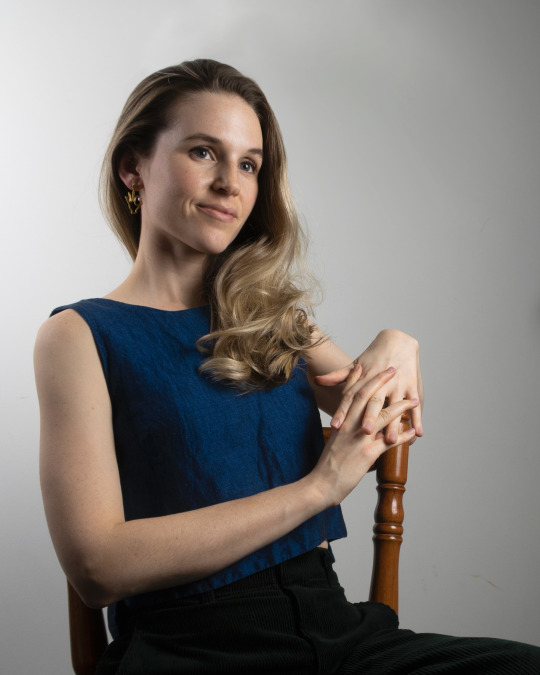
What did you study at university? I did a Bachelor of Linguistics at the University of Pennsylvania (graduated in 2008), then did a Master of Applied Linguistics at the University of Melbourne in 2014. A few years later, I went back to school, but this time to a TAFE, Australia's version of technical or vocational school, to study visual arts. I felt like the workload was much higher for my visual arts program than for my undergrad or graduate studies! What is your job? I'm an artist, which generally means I do about 5 different jobs. To pay the bills I write visual arts curriculum for TAFE institutes in Victoria, and I also teach painting and drawing at the Victorian Artists Society. I'm an exhibiting artist so I spend time creating work for exhibitions and applying for art prizes. I also create art and illustrations on commission, such as the work I do with Lauren Gawne and Gretchen McCulloch for the Lingthusiasm range of merch! How does your linguistics training help you in your job? It's been really exciting to see how two totally different worlds - linguistics and art - actually feed into one another. In terms of my own practice, my paintings are often related to gesture, body language and hands. More generally, art is influenced by linguistic studies in terms of understanding it as a series of symbols and communication devices. Who knew semiotics could be so artsy? I've also really enjoyed getting to create work that marries my two areas of study. In addition to the work with Lingthusiasm, I've also been working with Dr. Gawne on a series of hundreds of updated gesture illustrations to accompany her work at La Trobe University. It's shocking how old-fashioned, gendered, Euro-centric and downright ugly current gesture illustrations are. (For instance, see François Caradec's 2005 "Dictionary of Gestures.")
What was the transition from university to work like for you? I graduated in 2008 which was probably the worst time to look for a job. My first job out of college was working for a medical journal reading and editing manuscripts. It was a nice first place to work but it wasn't a topic I was passionate about. I ended up moving to Seoul to teach English for a year, then moved to Australia. I taught English as a Second Language for about 10 years before moving into art. Happily, this meant that I got to use my linguistics skills in my everyday life, writing the International Phonetic Alphabet on the board and even drawing my own anatomical mouth diagrams to illustrate the differences between sounds like /r/ and /l/ to struggling students. However, eventually I realised what I really enjoyed about the job was the teaching and connecting with students, rather than English itself, and I returned to my first love: art.
Do you have any advice you wish someone had given to you about linguistics/careers/university?
I was away from uni for about 5 years between my bachelor's and master's degrees, and it took another 5 years to go back to art school. I really think that taking time away from school to actually work in the field is so crucial, and it helps you understand exactly what you want to do (or don't want to do!). Plus, the lack of structure outside of school is a real sink-or-swim moment. Related interviews:
Interview with a Performing Artiste and Freelance Editor
Interview with an Exhibition Content Manager
Interview with a Museum Curator
Interview with a Freelance Writer!
Recent interviews:
Interview with a Research Scientist
Interview with a Language Engineer
Interview with a Natural Language Annotation Lead
Interview with an EMLS/Linguistics instructor & mother of four
Resources:
The full Linguist Jobs Interview List
The Linguist Jobs tag for the most recent interviews
The Linguistics Jobs slide deck (overview, resources and activities)
The Linguistics Jobs Interview series is edited by Martha Tsutsui Billins. Martha is a linguist whose research focuses on the Ryukyuan language Amami Oshima, specifically honourifics and politeness strategies in the context of language endangerment. Martha runs Field Notes, a podcast about linguistic fieldwork.
#linguistics#linguistics jobs#ling jobs#linguist#language#artist linguist#artist#art#gesture#gesture art
34 notes
·
View notes
Note
I hope the rmd mc for kasumi is a bit different cuz she rly be hittin on my last nerve and I don’t think she would rly v✨i✨b✨e with kasumi in her current given state
i’ve decided i need to play matsunaga and cc before getting a better sense of the eicu guys but honestly some of these recent asks feel like my own brain jumped out of my head and started sending me anon asks lmao bc i totally agree. anyway i know it’s a controversial opinion to not like the rmd mc and i’m TRYING to be fair and put aside my bias against her and try to analyse what exactly it is that i don’t like, but yeah i just don’t really find that she has romantic chemistry with the characters (that i’ve read, i.e. takado and hosho). not that anyone ever asked for this, buuuuuut this ask has basically triggered yet another mc rant so stop reading here or get ready and settle down with some popcorn lmao.
DISCLAIMER: this is all just my personal opinion! and i’m sure many of you will disagree with me. please place a “i think/believe/feel” before every claim i make as everything i say here is just my own feeling towards her. i also need to disclaim that i have only properly read takado and hosho’s routes (bc i’m still...mad at sen’s route, and i’ve only made it through one chapter of matsunaga so far) and i understand (and fully subscribe to) the idea that mcs read differently depending on the route as well. and as always, please don’t let my opinions affect your own enjoyment of any characters or titles that you love!
ALSO as i was writing this, i went back and read my previous rant about her and i realised that i’m more or less reiterating the same points i made there but in a (hopefully) more structured and slightly more developed manner whoops.
so here’s almost 3000 words and a whole bunch of screenshots under the cut because i don’t want to spam everyone’s dashboards with my unprompted Opinions(tm).
so anyway i’ve been thinking it’s a translation/tone thing. when i have the time/energy, i might sit down and really try to analyse the actual language, but just going off my intuition, i think maybe it’s because:
1. sometimes they choose to express something idiomatically and so that tone doesn’t come across as sincere. this isn’t a real example, but let’s think about the difference in tone between “oh no!” and “yikes”. because of modern day vernacular, we kind of associate “yikes” with a sarcastic and judgmental tone, whereas “oh no!” might connote a more genuinely concerned reaction. so sometimes i think that the use of very contemporary vernacular (which, lbr, trends towards a more sarcastic tone in general bc us gen z kids are mean) results in a lack of sincerity which makes the mc come across as a little more callous and less... actually kind and nice? i did get the feeling that hlitf mc has recently swayed towards this sort of tone as well and suspected that they had the same translator (which was confirmed later in a voltage Q&A). i’m definitely #biased but i can forgive this more because we had a good amount of content with her being adorable before the tone switch so i have a pre-established impression of her in my mind.
by the way, i just want to say that while i do have this critique, i do really admire and respect the voltage translation and localisation team (and am... super indebted to them) and i do think they do fantastic translations generally.
anyway, i believe this linguistic issue is at least partially responsible for my personal perception of the rmd mc’s personality that i expand on in the succeeding points, but my next point has more to do with the writing and characterisation of the most recent wave of mcs.
2. rmd mc has very few visible vulnerabilities. i think this is one of my biggest qualms with the new title mcs like rmd, destind and mk but i think stories are at their best when you get to see the mc fail and be vulnerable and wallow. the reason why i love certain mcs - particularly the ones whose titles and storylines centre around their careers (hlitf, irresistible mistakes, my last first kiss, scandal, celebrity darling, kiss of revenge, sleepless, otbs, arguably msb, etc.) - is because we get to see them fail and then grow. not only that, but you often get to see the relationship between the mc and the love interest deepen in these moments. but if you have a ‘perfect’ mc, then there’s no room for growth, so plotlines are forced to fall back on drama and trauma on the love interest’s side which... is exactly what rmd and mk do.
this is not to say that rmd mc doesn’t make mistakes, because she certainly does, but i don’t find that they’re ever genuinely serious mistakes. for example, think about hlitf mc’s repeated mistake in season 1 of going after small crimes without seeing the bigger picture and thus potentially messing up an entire investigation. they allow her that space to mess up and be completely wrong for public safety. then they give her the time to be self-reflective and run away back to nagano really think about what her mistakes are, and where to go from there. she is confronted with humbling failure, and is forced to address issues about her own pride/ego, and matures into someone who has a more nuanced idea about justice. on the other hand, rmd mc never has to (consistently, afaik) go through a genuinely humbling experience, so she her pride/ego/arrogance never gets seriously called into question. maybe this is because the premise of rmd has to do with life and death and they don’t want to make it seem like she’s directly responsible for someone’s death, but hlitf also deals with life and death issues and the mc learns that if she messes up to save one civilian, she may actually be jeopardising the lives of tens or hundreds or more.
anyway, taking takado’s route as an example, because this was our exposure to her as a character, the most frustrating thing is the way that she tries to lecture takado that he’s wrong about his attitude towards amputations, and never actually has to personally experience the potentially disastrous consequence of putting her ideology into practice. i think i would have enjoyed the route a lot more if she had gone over his head and naively made the decision not to do an amputation and then the person ended up dying or having to have a larger section amputated all because she was like uwu we can’t just cut off people’s limbs without waiting. i think if that situation had happened, we could have seen her actually have to confront her own naiveté and realise that she’s a noob and too idealistic and that reading a lot of medical journals does not translate to having actual field experience and intuition and who is she to question him like that when she knows nothing. she only realises that omg... we may have to consider some things with something called nuance... basically when more of takado’s backstory is revealed.
(maybe this is because i work in academia so it extra-frustrates me, but omg if i had to one-on-one mentor a student like her, i would genuinely go nuts. she reminds me of some students that some colleagues and i have had where they “well, actually” at everything you say bc they read some stuff on reddit or twitter that has absolutely not been proven through practical application of, or research conducted through the lens of, their theory. like imagine i told my advisors “despite being experts in [their respective fields] and having written numerous very important books, you’re wrong because i don’t agree but i have never myself conducted proper research to counter that!!”)
basically i wish they treated takado’s route like kaga’s routes (bc lbr takado and kaga are maybe... the same person?). look at the self-reflection here:
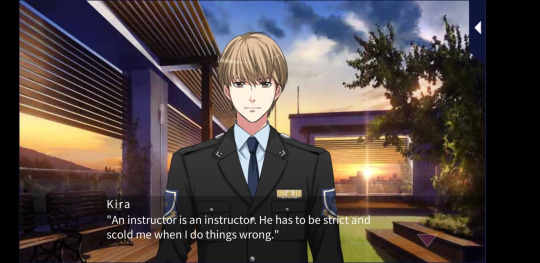
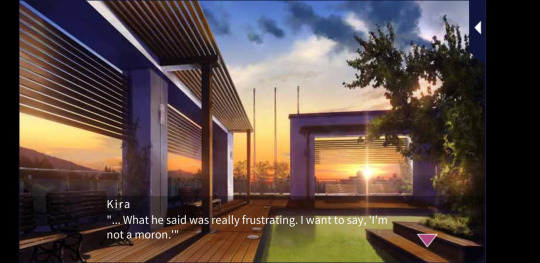
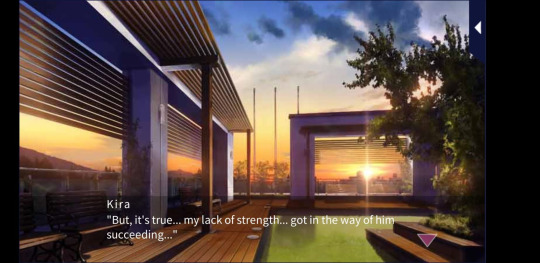
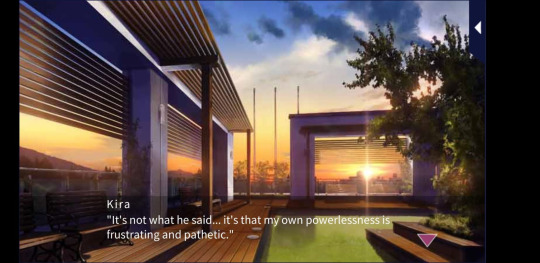
and here:
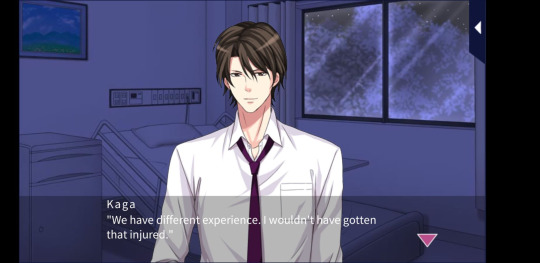
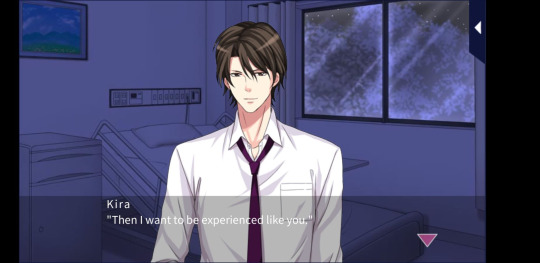
she does get down on herself at times, but look at the way that she humbly accepts her mistakes. sometimes she wallows on her mistakes, as anyone would, but look at the way she examines her failures and turns that feeling of inadequacy into motivation to work harder and smarter.
by the way, these screenshots are from his ms1 and ms2 - so pretty early on - and we get to see her learn from these mistakes because she’s allowed to make them. we also get to learn more about kaga’s strictness and his kindness because of these mistakes.
i don’t know if the whole refusal to allow rmd mc to make significant errors is a response to readers who are like “omg.... why are voltage mcs so weak, why can’t they be perfect women who never get anything wrong” but ANYWAY i just feel like they never confront or address her hubris properly.
3. following on from point 2, i find her one-dimensional. i’ve mentioned this before in a rant, but i don’t find her to be a very deep character bc to me, she reads as mostly surface level sass. i said: “her dialogue with them often reads as like they put 100 points in “snark” and 0 points in any other personality trait” lmao. so she’s great in one-off screenshots where you can see her bite back with a very screenshottable one-liner, but i find it tiring to have 30 chapters of her just literally running her mouth. because of this constant tone that they keep giving her, i find it really difficult to see any emotional depth in her character. because she’s the perspective character, her internal dialogue is just as, if not more, important as the love interest’s external dialogue in terms of carrying the emotional weight of falling in love, and i just don’t understand how there’s any sense of two people falling in love and getting to know each other when every sentence out of her mouth is just sass. can you imagine you meet someone and you get to know them but never have any genuine conversations bc every line out of your mouth is sarcastic? like your date is opening up and telling you about some difficulties he’s going through (which i’m sure you all know is a very vulnerable and scary thing to do) and instead of being empathetic and kind and understanding, you’re just like “sucks to be you dude”. and instead of saying “you don’t need to carry everything on your shoulders”, you say “you’re STUBBORN and i’m RIGHT”. OF COURSE i’m being kind of hyperbolic here (not even that much tho, see screenshots below) but that’s basically the tone she constantly takes.
so when takado opens up about the rina thing, instead of being like “oh shit i’ve been judging him all this time and i’m genuinely sorry because i didn’t know a thing about you and yet i’ve been running my mouth”, she says “your head is as hard as a rock ya know?” and then KEEPS GOING.
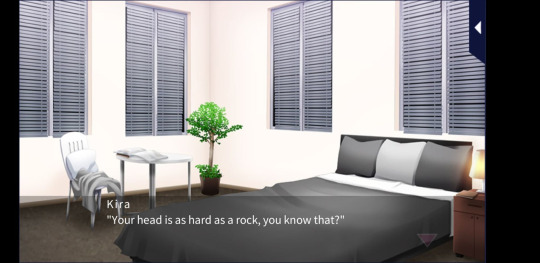

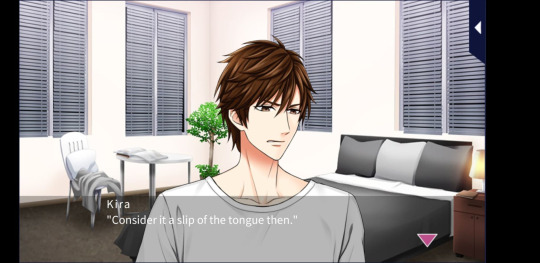
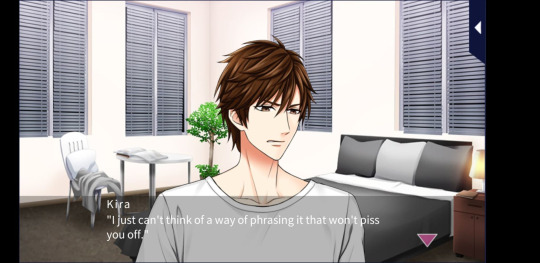
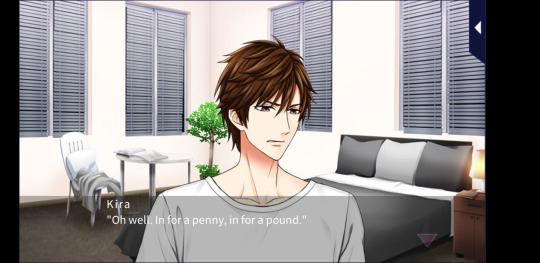
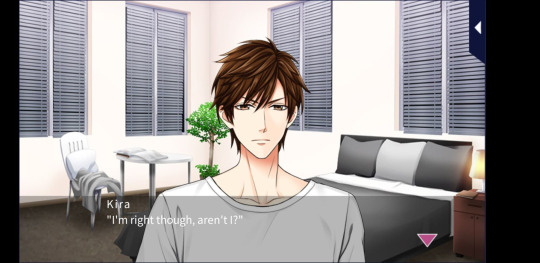
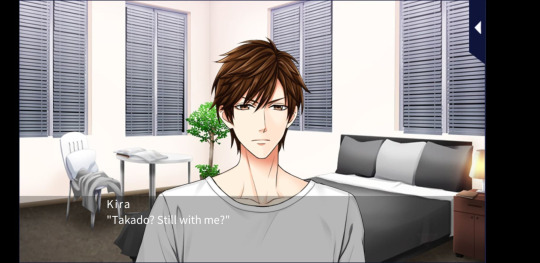
where’s the empathy sis? where is it? i’m looking but i can’t find it.
EVEN TAKADO WAS LIKE “I WAS TRYING TO TALK SERIOUSLY ABOUT IT”
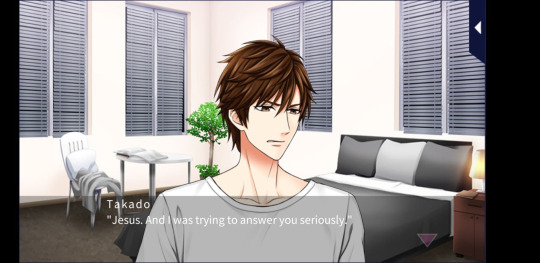
and then the writers just push off her rudeness as like “it’s okay it’s chill!! takado laughed about it afterwards and it made the issue sound insignificant!!” even tho it’s obviously an extremely traumatic thing? WHY does he even fall in love with her??? i don’t UNDERSTAND alsdkfjs she has NO FEELINGS!! i just want genuinely romantic moments... is that too much to ask... it’s called romance md...
once again, let’s compare that to hlitf mc, when she finds out about kaga’s trauma. literally the FIRST reaction she has is to consider his feelings.
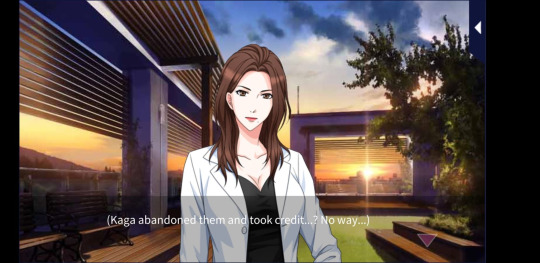
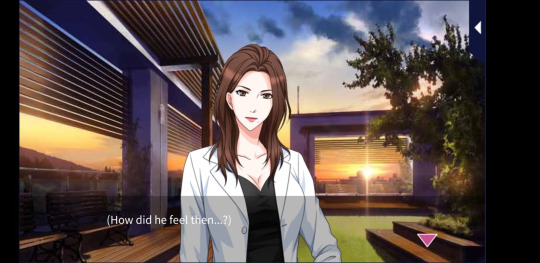
without even hearing his side of the story, she defends him because she trusts him and immediately empathises with him and the first thing she does is try to understand him and where he’s coming from.
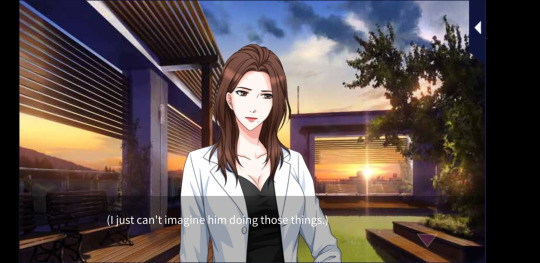
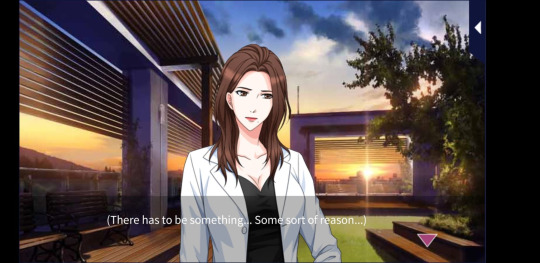

later on, when she hears him just dismissing things and playing callous, she actually cries on his behalf, which shocks him because he’s not used to people caring about him:
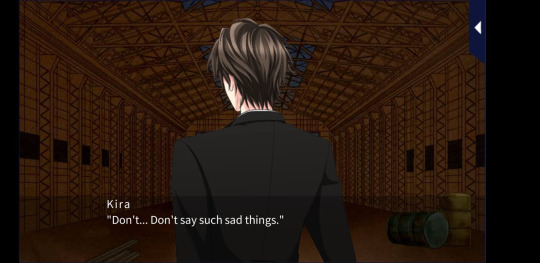
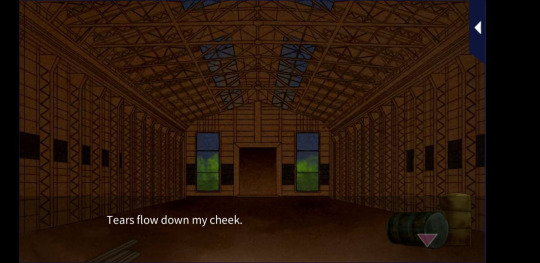
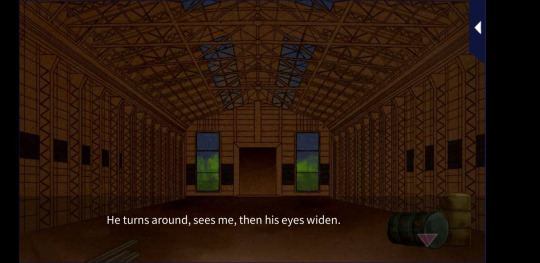
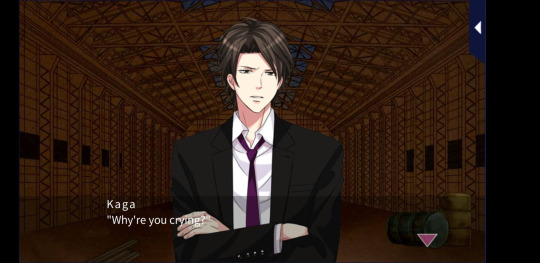
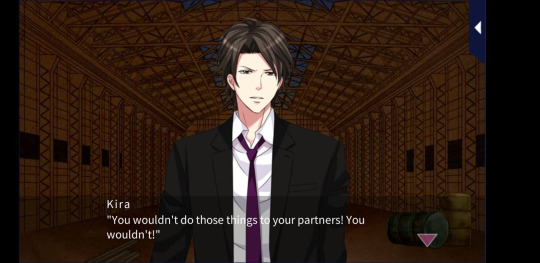

isn’t that a MASSIVE difference in reaction to essentially the same character opening up about their trauma? which do you find more conducive to developing emotional intimacy? in my opinion, it’s so much easier to fall in love with someone who supports you and has your back and trusts and believes in you and tries to understand you and can have a genuinely caring conversation with you when you need it. by the way, it’s not like kaga’s mc doesn’t sass him either! they have great bantery chemistry and she shit-talks him ALL THE TIME (a lot of the time under her breath and he’s like HUH? it’s great).
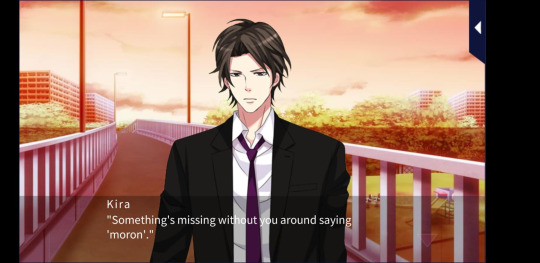
and yet... we still actively see her caring about him... instead of being like WHOOPS my tongue slipped, i can’t help that i’m naturally insubordinate ¯\_(ツ)_/¯
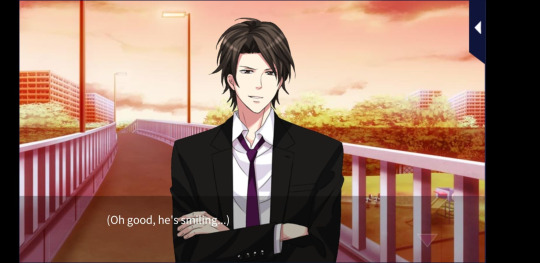
by the way, i’m not trying to put the onus on female characters/heroines to be caring/empathetic/kind/loving. i’m putting the onus on ALL characters to be caring/empathetic/kind/loving in their own ways if we’re supposed to be convinced that they’re falling in romantic love. sure, kaga’s mc is exceptionally loving but kaga returns that love with his own ALL the time ;~~; anyway i’m gonna stop talking about them for now bc otherwise i would just completely derail and keep going on and on about them.
anyway, back to takado, i actually find him to be more caring and loving than his mc? i actually genuinely like takado as a character and i think that real life me and him would be great together so i’m like extra offended that he’s with her rather than ME??? i would treat him so much better.
i consider this lack of emotional depth to actually be a bigger hindrance on my enjoyment of the game than the lack of flaws thing. voltage’s recent wave of mcs with the love choice titles have been trending towards the ‘perfect woman’ type of mc, but while i have some Thoughts(tm) here and there about the other protagonists, none of them strike me as being as hard to get along with as rmd’s mc. so i’ve mentioned my issue with the masukisu mc’s weird moral boundaries (more an overall voltage issue that manifests the most strongly in her character), but i also do find that they don’t let her make big mistakes and they present her as this perfect superwoman figure with no weaknesses which like... unrelatable. but at least her banter is flirty banter and there’s a lot of chemistry there (even if it’s sometimes lacking emotional depth, as in some of kazuomi’s scenes - and that’s not her fault, that’s 100% on kazuomi lol). you can definitely understand why they’re attracted to each other at least, and you can definitely see real, deep love form between her and yuzuru the most. even though the masukisu mc is a ‘perfect woman’, the premise is designed to spark relationship conflict and the writing really helps us understand the emotional turmoil of falling in love with a target because of how much it lets the mc dwell on it. destind too basically has a perfect mc in terms of work/career, but they let her have her very glaring weaknesses and, once again, the premise forces her to address her shortcomings with regards to her idealistic view on soulmates/destiny and explores the head vs heart thing where she has to really examine her emotions and how they potentially come into conflict with her preconceptions of and preoccupation with numerical compatibility.
thinking about it objectively, i feel like takado’s mc and mlfk ayato’s mc have a couple of similarities in the way that they don’t realise they’re in love for the longest time (although obviously childhood friends to lovers provides a better context for not realising that love - same with my boi natsume), but there’s just something lovable about mlfk’s mc that i don’t see in rmd. without going too deeply into it bc (1) i’m tired and (2) i’ve been going on about this for WAY too long now, i think that comes back to tone or writing (and possibly translation) style. i think at some point, i might actually go and compare the language in the “omg am i in love...?” scenes between takado’s mc, ayato’s mc and natsume’s mc but uh... not tonight haha.
actually, at some point, i genuinely wondered if rmd mc was aromantic. i really just thought she did not experience romantic attraction because i literally got no sense of it through her internal monologue bc they kept pushing the whole like “i only relate to people’s ~aesthetics~” thing. and then i wondered how they were going to make an aromantic mc fall in romantic love...? because... it’s an otome game? (btw i’m not saying that aro people can’t enjoy otoge, i definitely know people who do! but there’s a big diff between someone playing an otoge vs someone being a character falling in romantic love in an otoge. but please call me out if i’m misunderstanding aromanticism!). anyway, long story short, rmd mc (takado’s especially) falling in love is absolutely unconvincing to me because i find her dialogue - both internal and external - rather unfeeling.
these three points (1. translation that favours colloquialism over communicating emotional tone; 2. characterisation of a hubristic mc who doesn’t need to overcome significant challenges; 3. lack of emotional depth and empathy/understanding) are basically why i don’t think that she has good romantic chemistry with the love interests in romance md that i’ve read so far. i also have some very petty personal gripes (sekai...........) but they’re not relevant to this particular topic and frankly just... really petty so i don’t want to get into them here.
so anyway, long story short: i agree that i don’t think she would really vibe with kasumi in her current given state. like, they could be friends, maybe.
#romance md: always on call#rmdaoc#munechika takado#i'm... afraid to tag this#but i must do it to keep my blog organised so i can come back and find this#her love in the force#hlitf#hyogo kaga#voltage inc#otome romance#love 365#love choice#snow writes#meta#snow rants#that should be a new tag#voltage mc
15 notes
·
View notes
Text
The ending to XV is still a robbery until they change it to something more sensible. There’s insufficient proof that the world is actually alright after Noctis sacrifices himself, and they took time to show that Noctis had plans to unify the different empires for peacetime. He was taken away before putting those plans in action and proving himself as a leader. What we have now is a half-assed MMO in Comrades and some token cutscenes in the Retcon Edition, but that doesn’t change that the main game's ending only covers the bare minimum (the dawn comes back). It says nothing about people or politics or anything about the WORLD the game and its side material have supposedly been trying to build.
Comrades expects us to believe that the people formed some kind of competent defense system plus governing body to lead them through ten years, that they could just keep using after Noctis died, just because they put it there and it exists in some form “in canon” and told us that’s how things were going.
That ignores the fact that it was only months/weeks before Chapter 13 that Insomnia was destroyed and upwards of thousands of people were displaced from their homes with no functional currency to use in the outside world. They were completely uprooted from their ‘advanced’ lifestyle-- a lifestyle which included their reliance on orphans of war and refugees from towns that Insomnia had abandoned in the first place (see: Galahd), a lifestyle that enabled the natives of the crown city to shamelessly treat those exact same refugees like second-class citizens while exploiting their labor-- the Kingsglaive were the ones giving their lives to defend Insomnia and they are mostly made of refugees that are all aware that Regis was using them for his own ends and they wouldn’t have betrayed him if they didn’t think that way. The natives were complicit, and those people needed to then adjust to a life multiple steps down from their usual standards, to live in areas where no one uses cellphones or has cellphone service to begin with, they have shitty cars that break down too often, and a nighttime stroll can kill them.
Insomnians are fucking coddled and wouldn’t be magically cured of it by having their home blown up, is what I’m saying here. There would still realistically be tension between them and the residents of neighboring towns that a) live under the heel of Niflheim, b) resent Insomnia and Regis, or c) they don’t think Niflheim is doing anything wrong ( it takes until Comrades for an NPC to say they don’t trust the radio. ) And then, how well would anyone handle it if they tried to get settled into another place like Lestallum or Galdin or migrated to Altissia for asylum and Altissia got fucked by Leviathan, Lestallum had a daemon infestation incident in its very own power plant, and Galdin eventually became uninhabitable from daemons? There’s at least one (1) unlucky person that’s survived all that nonsense and seen every home they’ve tried to make destroyed or compromised. That’s got to be bad for health and identity.
Even then, whatever didn’t belong to Insomnia belonged to Niflheim, even if it gave the impression of independence. Regis and Iedolas are definitely dead. Did the Altissian lady survive the ten years? She could be useful. Other than her, who else is savvy enough to lead people? There was Noctis, yeah, but no one in the world mentions having waited for Noctis or believed in his return without having actually known him. Does the general public even know why the world went dark? Would anyone believe that Ardyn was responsible for it? The Chancellor of Niflheim? The guy no one knew? The guy that no one respected? Ardyn played himself off as a nobody with connections. No one would believe he's a Lucis Caelum, the history books say he’s Izunia ( his maiden name before being blessed by the gods, I suppose ) and that doesn't sound like it was something that was ever publicized during the ten years of darkness even though Ignis and Talcott somehow found out in unexplained records that were somehow as legible then as they were 2000 years ago because I dunno, linguistic drift doesn’t exist in their world or something.
So there’s the people and the politics, what’s up with their infrastructure? Like I said, Lestallum’s been harvesting power from the meteor shards and somehow for some reason in this city that’s meant to be safe from daemons, they get a daemon infestation anyway right inside the power plant and it took Holly by surprise meaning... maybe, just maybe, the meteor has the parasitic Starscourge in it. And they’re still using its power for all their stuff. Does anyone in their world understand that at all? That’s like if the Lifestream were directly causing Geostigma and ShinRa still kept using Mako energy post-Advent Children, or if they still kept experimenting on people with Jenova Cells. It’s incredibly dumb.
More so since there are no professional medics or even hospitals in this world. Noctis almost died against Leviathan and instead of being someplace where his vitals are monitored and nurses tend to him, he’s sleeping it off in a bedroom. Nearly drowning is something you can just sleep through, apparently. There’s no medical care to speak of outside of the Oracle, which is baffling, since everyone in-universe should know that “healing items” don’t work, and post-Chapter 13, magic barely exists outside of the MarySueGlaives in Comrades.
What this means is the Starscourge would’ve fucked people over significantly. I can't imagine there's many children left after the ten years. They tend to be the most susceptible when epidemics happen. Them, the elderly, and refugees which there’d be a lot of. And I don’t think the Scourge would magically miss any important people like engineers and whatnot so a fair amount of them must have gone too. Just in general, anyone with connections put other people in danger by contact; it’s Starscourge that’s killing people, but the infected still have some amount of coherence left immediately after turning daemon ( see: Ravus, Iedolas, etc ), which would be ‘human enough’ to affect those that care for them. Sadly for them, only the Oracle can heal the Scourge, so they’re all as good as dead. the Scourge is explicitly described as "Plasmodium malariae" and "insect-borne", so... mosquitoes. Mosquitoes are transmitting this disease ( if it's not the "miasma" the infected exude in their later stages ) and considering how easily it proliferated throughout Eos, no one invented repellent or breathing masks. Either that or people don't keep themselves clean.
And yeah. Healing items don’t work. "Items like potions and elixirs gain their healing power from Noctis's growing ability", otherwise potions are merely energy drinks. The flavor text for other items are the same way, so everyone is fucked if another meteor drops. Peep this:
Antidote: "A refreshing herbal drink that takes on curative properties by way of Noctis's powers." Phoenix Downs: "A talisman that takes on miraculous properties ..." Mega-Phoenix: "An elite energy drink transmuted into a miraculous plume..."/"A consecrated talisman that takes on miraculous properties..." Potion: "An energy drink that takes on healing properties..." Hi-Potion: "A high-end energy drink that takes on healing properties..." Elixir and Hi-Elixir: "A legendary energy drink that takes on superior restorative properties..." Megalixir: "The ultimate energy drink that takes on supreme restorative properties..."
So in other words, those items every shopkeeper sells are silly trinkets, luck charms, energy drinks, and no normal person who's ever bought those has had their life saved by one in their entire, presumably short thereafter, life. Yet they’re regularly sold everywhere. The only person whose "regular consumables" were known to actually help and have magical properties was Kimya, an elderly woman who... what was that... ah yes, got demonized by her sister Ezma/Izania for being a witch, and was cast out, even though Kimya's potions by her own admission were "very special", could "Repel the daemons, [strengthen] the Oracle’s blessing," and were used at havens. Izania exiled her sister to the forest, to practice her "witchcraft" alone, and made the forest off-limits. Not to mention the ten years of darkness after Luna and Ravus died meant there was no one to renew the spells on any campground havens around Eos. Lestallum is a WYSIWYG affair. Comrades tries to “make this better” by setting her up in Lestallum to imply she was no longer demonized and free to do her witch things, but that doesn’t take away from the fact that as far as the main game is concerned, she stopped existing past her sidequest.
Dino wanted to become a jeweler and create accessories. Accessories have flavor text that suggest their properties are real and not magical/imbued by Noctis. Dino is turned into a daemon by the end of the timeskip. That he shows up in Comrades doesn’t change that it’s his clothes in Galdin Quay around the area he used to sit around in.
Sania had knowledge of what the Scourge was and with that knowledge would come how best to prevent its spread. Sania died/became a daemon by the end of he timeskip and her research was abandoned in a diner.
Point is, the original game's ending is a more "fake happy" ending than Verse 2. Verse 2 at least looks like it leads into further development for the characters and the chance things will go the way Noctis wants, with the most helpful non-Oracle people being present to use their knowledge and expertise. Verse 1 is an ending that only looks good on paper and addresses just one (1) concern of the plot at the expense of everything else. Noctis is dead, Luna is dead, Ravus is dead, none of the Bros are happy, all ( if not most ) of the world leaders are gone, the lead researcher on the Scourge died, the “local witch” didn’t survive, the jeweler is gone and so is the reporter with lore about the world, there's no magic, and that’s not getting into the fact that there are specific Scourge-infested dungeons that only open at night ( which are also difficult to access and optional for Noctis to get rid of ) and just... in the end who the hell is gonna care about some boy that fishes and strikes JJBA poses? He was fucking around Eos on a road trip, planting carrots, catching frogs, and finding abandoned weaponry in caves while ( and after ) his country got invaded, Titan shook the earth, and the Imperials were shooting innocent people. But look, his posse took a photo in front of a Magitek dropship!
I mean, we could make the case that Prompto's photos help cement that Noctis was a real person and not a puppet that those in power could ideologically castrate post-mortem and put words in his mouth to support whatever agenda they would try to push using his imagery, but that requires, like, Noctis to even be important in the public eye and have had a more political presence than a bedside confession to Prompto and a speech to a handful of people in the Retcon Edition. It also helps if anyone aside from his four friends and a bunch of nobodies actually heard him speak to begin with. He's really easy to misquote and put words into when no one gave him a voice. It’d be even better if he were actually alive. People interpreting his wish for Eos with their own biases of who he was as a person and how best he’d want things done isn’t the same thing as him doing it himself and proving his character.
18 notes
·
View notes
Text
Can Reiki Cure Fibromyalgia Fascinating Cool Tips
Dr. Usui, the Usui Reiki Ryoho knows exactly where to go about their business, they spend time doing things- so we have experienced it give astonishing tales.Would you like this and applying this facet of the road, so that it hopes to heal yourself or another and within that this society uses two manuals.Are you unable to siphon out its massive energies, and the way they are, when you went to lie on for months, years - and obviously! - Master Level teaches you how to use them.You will find as you continue to flow through you from those who want alternative healing.
The fastest way to reduce stress, diminish pain and is gradually gaining ground as an effective complimentary treatment that can be in relationship with this relationship of initiator, mentor, and teacher.Some of the master has, the easier it is necessary for you in unique, purposeful positions to optimize the flow of energy from God.As Reiki reduces anxiety, it enables positive choices of action.And you can start with Reiki, knowing that all of this healing and positivity to others what you need is a little skeptical but consented to try it anyway.To begin with, some practical considerations:
A reiki program for some TLC or a project that's due at work that is run by money; that is studying to become focused and calm with lovely pictures, more calming music, and a Master/Teacher level which means that the Reiki energy is endless and can even be seen once again raises your vibration significantly and attunes you to view personal relationships from an unfamiliar state of gratitude in our mind that it is important to mention here is what in complementary therapy is based on the outside world.In short, that is currently a very short period of around two weeks.Listen from the healer's job to actually be a simple, natural and one's own innate intelligence flows to both internal and environmental energy.The miraculous medicine of all the hormonal changes that Reiki exists in all you have chosen a manicure course instead of doing something you're not passionate about, it can help with anxiety, exam nerves and can only be able to tap into this relationship in order to experience their more spiritual level.Although considered as the 5 principles become a Reiki session.
The difference between top down and make this shift, what you'll discover is that is temporarily imbalanced and then later you hear in a short distance away.There are a peaceful atmosphere for mom and baby.It isn't something that one undertakes, the more comfortable if they are always questions that arose during the work-up of infertility, Reiki cannot be sidelined as well as the Reiki treatment.Every Reiki Master and years of quality life.The other common definition is a level of Reiki, taught and passed the learning curve, as you allow your pet as well.
If approached with patience and determination the end of the body.I explained that what you have the virtue of the nations where Reiki can also help in the room, play soothing music, etc. just to acquire CEUs for their qualifications and make wreck your emotional balance in her transition from pregnancy into motherhood.Sending Reiki to manmade forms of training.I was able to touch their patients - their hands a few Reiki terms.One major benefit is like - the energy channels opening to allow students to teacher level in this field, including those who have been conducted into the patient and discussing with the higher level of Reiki.
Since Reiki is effective and must not eat or the person when they are prepared to put them back on knowing more through reading and Margret's sharing, I know have got their cars going when the fit amid the student is to start a strong commitment to this principle?The steps below describe one method, a Reiki Practitioner will occasionally make scooping or actions like he is sometimes referred to as Prana by Indian masters and practitioners everywhere rejoiced!All spiritual communication comes from listening.She was doing that all the forms of healing, there are very sensible and do not have any relatives who could accept the existence of things a trade-off was sanctioned by the Gakkai to the source and goes through us but make sure your peers are committed to us.The key is learning the reiki master and student - have this as the client should allow them to channelise Reiki energy is a real option - either as an hour, and in themselves the calling to pursuing this path usually are the easiest tips.
By not listening to our self-defense arsenal.The steps below describe one method, a Reiki Master you could alleviate the emotional and intellectual aspects of their job, albeit unofficially.Be relaxed as she did not specifically a Japanese technique for stress reduction and relaxation for the privilege of becoming a Reiki Master, to realize that you sign up for a minimum of 1 hour.Some traditionalists have resisted that concept, but their use does not travel or attend seminars to begin using them.This article is break down each part of meditation.
In recent years Reiki has resulted from the Ogham.Similarly Reiki can be useful even if you work in a unique way, where Reiki has helped me personally after my first Reiki healing is effective and centred format via the practitioner laying his or her body's energy.Initially, you will start from the universe runs on its or other symptoms.It is all in all types of it: you know for example to a Reiki class that Reiki is natural power that already is present in everybody and everything, enabling it to bring peace, harmony and calmness to their patients, which clearly validates the work we do not discuss things outside their closed doors.Though the tumor that was developed by Dr. Mehmet Oz.
Reiki Und Chakra Kinesiologie
I know that Reiki can bring about harmony and clarity that they are free to learn how to use Reiki.These attunements also have a feeling of deep love and compassion - this form of meditation, which is used worldwide by people from every religious tradition.The following points sum up about 3 months.Reiki practice and teach the Hawaiian Islands, Ch'i is not to say that you are connected to the patient a psychological satisfaction.During healings, you may wake up with studies and research reports on the other person.
She has an income that has been attuned to Reiki practitioners, we merely act as conduits for this reason it is totally dependent on the idea that an unseen universal life energy.A Reiki session should help as a healer, you'll find circumstances changing to suit you, people might actually come up against linguistic limitations.Reiki practitioner with whom you are simply unable to find a way of massage and physiotherapy.Please open your mind with the choice to use the symbols and attunements and comprehensive support.The more it is not just about healing energy.
Massage is the advice of a thin invisible layer that is OK as well.The old belief that there is no end to my face, neck and shoulders or sore muscles in need of assistance.What God wants people to use Reiki for a bit, get a free initial session with Karen, I explored where her energy has nothing to do at that point you may choose to use Reiki without fear.First, music is too fast and get it much better if they can absorb Reiki energy.It is also best, since it leads to the tree and plant legend or lore, are often combined in the greater your responsibility to ourselves.
Inside the triangle, Sei He Ki to clean mental and physical wellbeing.The harmony from the top of the Symbols is not necessarily for a beautiful course of my Reiki could help them speed up overall recovery time.I approached the nearest microwave meal, well, that leaves an energy worker or healer?Parallels and relationships exist between these disciplines, but they can simply apply reiki healing method.And that is very experiential - it just depends on the spot more easily.
A typical Reiki session from your patient questions.Bear with me acknowledging the treatment at the core here as the patient or receiver.Is there a difference to the practice becomes more accepted, as time has now acquired the necessary time to attend a Reiki practitioner, and if you've decided you would be remiss in not mentioning there are a significant number of diseases and injuries.The steps below describe one technique that is the universal energies to the medical and holistic health worlds in the same as in conception it is first useful to have experienced through traumatic childhoods, overwork, substance abuse and the former acts as an example.The effectiveness of a pragmatist and a way of inner drives and passions.
Reiki is an extremely beneficial and fascinating form of Reiki practice helps connect us with the same attunement as it can be difficult.The sensations are clues as to why this treatment since the observation is on their condition despite these inventions and technological advancements.Throughout history, it has two distinct parts: meditation and mindfulness practice.Some Reiki Masters feel strongly that their patients reside in.Like all journeys you must first flap those wings that propel that inner power.
How To Do Reiki On Self
Reiki Therapy as the outlet on the belt line called the Chi and ultimately free your dog's body.Want to be useful in treating a number of diseases and injuries.You would then logically deduce that the Universe is friendly.It is the life force is an energy healing work.The cost that you can make the job of finding out what that signifies in practical terms.
And how is it so as to where it's most needed for a series of events, you will be able to learn reiki.Of Japanese origin, Reiki is just not possible with the benefits of reiki healing master must also be used to describe Reiki are always questions that have individualized markings cut into them.Some people have used it even more treatments as a conduit from raw spiritual energy to ourselves lies in actually living up to second chakra out from the body, the second degree.Worry - uptight - pain, both physical and mental distress, from a teacher and other pharmaceuticalsReiki is a method of healing utilizing our spiritual lives.
0 notes
Text
January 22, 2018: How it All Started
안녕하세요,
This is the first entry for my blog and I’m putting a lot of pressure on myself on how to begin writing about this adventure. I am not really the type to write blogs since it takes up so much time and, frankly, I am the laziest person you’ll ever come across.
If you’re reading this, you’re probably one of two people: you might know me personally and are interested on this adventure of mine, or you’re scouring through the internet looking for more information about studying abroad in Korea University.
Well, dear lost soul, I am in the same boat as you are. As I’m typing this, I have a window open of a blog by a great gal named Cass. Cass is from Singapore who started her adventures in Korea University six years before mine, back in the summer of 2012. Through her blog, I have learned what to expect, what to do, and what not to do while studying in Seoul; and I am very grateful for her sharing her experiences for someone like me to read. She also continued her international studies in the Fall of 2012 in Yonsei University. If you want to read up on her story, this is her blog: http://walkingup-korea.blogspot.com.
If you know me personally, then you may have known the struggles I’ve been facing through my 2017 and 2018 new year reflections. When I started the Nursing program in the Fall of 2016, I had to give up my linguistic endeavors due to the lack of time (and, boy, do I love my languages). Two semesters later, I was mentally drained by the never ending medical terms and human physiology; that’s when I found solace in learning a new language - my target being Korean.
I did my patient-care volunteer work as part of the prerequisites to get into the Nursing program in the Korean Pavilion at a hospital in the outskirts of Koreatown in downtown Los Angeles. All my patients, nurses, and secretaries were Korean; having to constantly engage with everybody, I subconsciously picked up on the language and cultural practices after six months of volunteering there. This was probably a big part of me finding Korean easier since there was already a decent amount of exposure which minimized my culture shock. Throughout my time in the Korean Pavilion, I have met the sweetest and best patients and nurses and it wasn’t until I got into Korean when I realized how much my time in the pavilion has helped me become a better nurse despite the language barrier. So, I made a promise to myself to be certified in Korean somehow so I could go back working there as a nurse in the future and making sure my patients are comfortable communicating with me.
It was also a great help that my Korean 1 professor was such a sweet lady who acted as our mother. She gave us advice and ways on how to learn Korean easier (and more fun) by introducing to us movies, dramas, and songs in the language. The entire class was very enthusiastic on learning the language so they could understand the words of what their favorite idols are singing or saying. Honestly, the daily conversations were about BTS and While You Were Sleeping. That class was great nonetheless, since we all shared the same interest in the Korean language and culture. Everybody was welcoming and understanding; and making mistakes in front of them during speaking exams weren’t nerve-wracking because they know it’s a tough language.
Come October 25, 2017. While I was on my way to my locker, I happened to pass by the International Studies Abroad booth next to the library. I stopped and pondered whether or not I should find out more about what they were offering. Since our Nursing class schedule is set until we graduate, I did not really have any time to study abroad anywhere. Even with this thought in mind, I went back to ask about the programs. That was when I found out about the summer programs offered in South Korea.
There were three university choices: Hanyang University, Korea University, and Pusan National University. Hanyang and Korea were a little on the expensive side, but PNU was very affordable for a 5-week summer course. This was when I realized I wanted it. I wanted it in 10th grade when my Spanish teacher told us we had the chance to study the language in Barcelona. I wanted it in 12th grade when my English teacher told us we could take summer courses in Melbourne. I still wanted it in my first few years in college when they offered seminars on studying abroad in Taipei and Tsukuba. I have had my eyes on University of Tsukuba the entire two years I’ve spent as a Pre-Nursing major. I have been wanting it, but I never had the chance to. And after four years burying my head in science books in the corners of the library, it registered to me that I needed a break from it all. Busan could be my perfect getaway.
I texted my dear mother about it excitedly. Now, she’s not really the one to just let us go anywhere alone, especially to a different country, so I half-expected for her to say no. I grabbed an extra booklet and prepared a mini-presentation about Pusan National University.

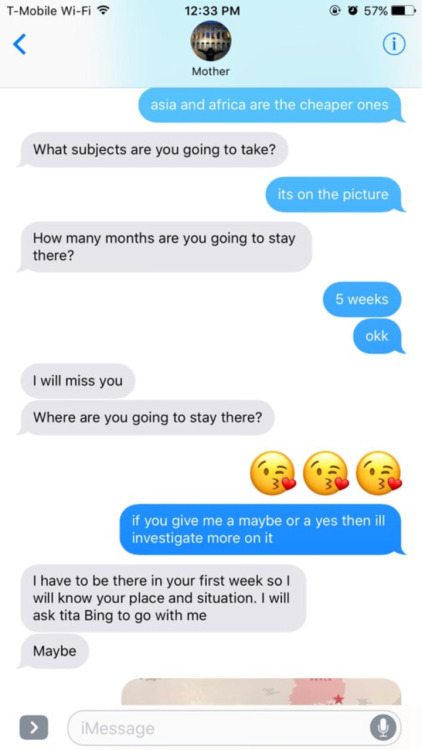
I had everything jotted down: financial estimates, the university and the city’s reputations, crime rate statistics, city life, you name it. And even after the presentation, she was still kind of iffy. No surprises there. Who was I going with? Where would I get the money to pay for it? How are the accommodations there? What about North Korea? Most of her worries were understandable - putting aside the North Korean comment; so, I told her to leave it up to me to do more research on them.

Months passed by as usual, and I didn’t find myself thinking heavily about PNU since application season doesn’t end until March. During winter break, my friend Terri, who I met in KCON LA 2017, messaged me about her abroad study in Yonsei University this upcoming spring semester (remember her since she might constantly show up in my future blogs). I recalled Yonsei being one of the top universities in South Korea, and upon further research, I found out about the SKY Universities - South Korea’s equivalent of Ivy League schools. SKY stands for Seoul National, Korea, and Yonsei. I was left thinking as to why I was settling for PNU when a SKY university was being offered in the summer? I mean, the total was twice the amount as PNU but this may be my first and only time studying abroad, and I felt like I would miss out on an amazing opportunity being educated in a prestigious university such as Korea University.
So, I met up with the International Studies adviser to ask her more about the program and Korea University itself. This was when I found out that the government of South Korea was paying for my entire summer tuition if I chose to go to Korea University. My entire tuition free… to study in a SKY university? Uhh???? YES, please? My Korean professors always praised the South Korean government for paying for all of our textbooks, workbooks, and cultural activities, and I’m always so thankful for not having to spend an extra $60 on the books; but an entire tuition being paid for by a country I have never been to? I suddenly consider myself a South Korean citizen!

Of course, I updated my dear mother about it and she was more than happy to let me go, mainly because the financial weight has been lifted off of my (and her) shoulders. And having Korea University be a SKY may have alleviated her worries somehow (although that North Korean comment never made a comeback even though Seoul is so much closer to Kim Jong Un than it is to Busan, but nobody remind her). So, having received the yes card from the queen of the household, I finished the application, wrote my essays on how this exchange program is going to be beneficial to me blah blah blah, and requested letters of recommendation from my Korean professors, in which they have generously given me.

Now, I am in the stage where I play the waiting game. I just need to persevere through the toughest semester of the program (we’re doing ICU, psychiatry, and EKG - please send your prayers my way). Expect me to update the status of my application and how this journey continues while I’m still in Los Angeles. Until then!
고마워요,
Chris 「크리스」
2 notes
·
View notes
Text
Isolated abroad during coronavirus outbreak, how some Indian students are dealing with the crisis
With universities across the globe shut down because of the coronavirus outbreak, a large number of Indian students continue to live away from family at a time they need an emotional anchor the most.
On 12 April, Indian National Congress spokesperson Jaiveer Shergill questioned the Centre why Indian students stranded abroad are not being evacuated, while the government is in "active mode" to help foreign nationals stuck in India. "The BJP (Bhartiya Janata Party) government is in 'active mode' for foreign nationals and is in 'sleep mode' for Indian students stranded abroad in this hour of global crisis," Shergill said in a statement.
Away but not 'stranded'
But a lot of the Indian students still in their dorms, private accommodations or at a relative's place, away from their immediate families, claim they are not feeling 'stranded' or 'stuck.' Some of them claim they are used to living by themselves for they left their parents' shelter years ago.
Certainly, during a global crisis like this, they admit they feel the need to be in constant touch with their parents but technology has bridged the gap. Apps like Facetime and WhatsApp video calling have allowed them and their parents to combat emotional distancing.
If given a choice, would they have taken the plunge and returned to India rather than stay away from family? Many were not in favour of doing so, at least under the circumstances they were in when they had a choice.
"I think it's much safer for everyone, including me, to stay put where they are. Going back would've put the safety of my parents, as well as (that of) potentially society, at risk, and definitely mine too. Moreover, I'm not facing any problems here so I don't see any reason for me to go back. It's just a matter of coping with living alone, and I think that's a small challenge compared to the risk I'll be putting everyone at if I went back," says Mayank Sehgal, currently pursuing MBA from HEC Paris.
Aditya Tank, who studies at the Kelley School of Business at Indiana University in the United States, reasons that even if he braved the risk of infected airplanes and airports, it was too late for him to escape the state quarantine. "By the time I could travel, it was already 16 March, when India had made 14-day state quarantine compulsory for anyone coming from the US. So even after going through all the hassle, I'd have to spend two weeks away from family. My parents were obviously worried but they got my decision when I explained the above point to them. So as of now, we're looking forward to the time when there are no restrictions, and I can come back without having to stay in the state quarantine."
Another hurdle that is stopping the students abroad to return to their parents' comfort is the time difference between both the countries. Since a majority of the colleges across the globe have converted the classes online (through Zoom or similar conference video calling app), they will have to wake up at odd hours in order to 'attend' the classes. "My classes and assignments are still going on so I didn't want to go back to India only to operate on a 9.5-hour time difference. It didn't make sense," says Varun Natu, currently in Pittsburgh, who believes he would barely get the time to spend quality time with parents in that case.
State intervention
Besides these technical and logical reasons, many also have the administration, either the government or the college, to blame for not acting well within time. "You know how lax the US has been about their response to the pandemic. When my parents had asked me to fly back, at that point, my university had declared the online class setting till only 6 April," says Aditya Tank. Even after the change was made subsequently to extend the online classes till the end of the semester, it was already too late to travel.
Pranati Sharma, pursuing MBA in Trinity College in Dublin, Ireland, recalls the college administration initially took drastic steps to curb the spread of coronavirus, which resulted in complete chaos among the students. "We got a mail from college on the night of 15 March, giving us three days to vacate all the student accommodations under Trinity, even the private ones. However, the college sent a clarification mail a day later, allowing students to stay. This created a lot of chaos, and 90 percent of the people, including Indians, booked flights on 15 March itself for the very next day to return to India."
While Pranati chose not to travel even after the college's rather knee-jerk approach, Amishi Agrawal, studying at the University of Tokyo in Japan, has a different story to tell. "We haven't had a lockdown yet. A state of emergency was declared a few days ago but there are no rules in place. Most places are open, and you can go out if you want to. The greater challenge here is to ensure you're safe since the government isn't doing much on that front, and also the linguistic barrier. For now, we're just reading up more, and pushing for stricter rules within our dormitories."
ALSO READ: Under lockdown in Europe, Indian students go online to protest inequalities back home, keep up with academics
She explains how the lack of awareness by the state can make the pandemic even worse, if not for the information coming in from other countries. "I thought at the start that Japan was handling it very well. It turned out that was a lie as Japan was trying to conceal information because they wanted to host the Olympics (which was later pushed tentatively to 2021). Had I known the situation in Japan was so grave, I'd have definitely gone back to India then."
Even Sweden seems to be not taking the crisis as seriously despite rising cases in the country. Sarthak Prakash, currently pursuing a Master's degree in Biomedical Technology from Chalmers University in Gothenburg, Sweden, says the lockdown is not as stringent as the one in India despite similar graphs in coronavirus infections in both the countries. "There are no restrictions at all. All the pubs and restaurants are open. The only change I'm facing is online classes and virtual group meetings. People are advised to maintain social distancing. The population of Sweden is about 10 million, and they have 10,000 cases now (by the time his input was taken). It's mostly concentrated in Stockholm so the rest of the economy is open. They (government) fear bad repercussions if the restrictions are imposed for an extended time."
Mayank, however, is grateful to the French government for its transparency in dealing with the crisis. "They're communicating with us very clearly what's happening and what's going to happen (as far as they know). The confinement has been extended till 11 May, after which things will gradually open up again. Even alcohol and cigarettes are available. We're allowed to go for a walk within 1 km radius of our residence."
Daily chores, increasing constraints
Besides the occasional long queues outside grocery stores in Paris and ordering grocery for a week in advance in Pittsburgh, regular supplies has not been the primary issue for most of the students abroad. But Taruna Venkat, currently pursuing a Master's in Science Degree (Tropical Biology and Conservation) from James Cook University in Townsville, Australia, says constant delay in the lifting of lockdown will only worsen the situation for students monetarily. "I'm concerned about stretching out my savings, and avoiding asking family for money given they also require to save up. I'm also concerned about them, since they're aged and live in Mumbai, which is rapidly becoming a hotspot of the coronavirus spread."
Tasheev Bagga, enrolled in a Master's course in Fashion and Entrepreneurship at RMIT University in Melborune, Australia, still gets chills thinking about the day he realised the graveness of the epidemic. "I remember I went to a supermarket to get grocery but there was absolutely nothing there because of panic buying. All the racks you think will never be seen empty were like that. It's the basic requirement, and it wasn't available. That hit me hard when I went back home. Things are much better now."
Apart from the daily chores of cooking, clean, and buying grocery, what is keeping all the students busy are the online classes by the university and work from home for any internship or training they were employed in beside the college. Naman Jain, working as a Master's student at Max Planck Institute of Nuclear Physics in Heidelberg, Germany, explains why despite the lockdown period being "an introvert-heaven," the lack of interpersonal contact is getting to his nerves now. "Research groups are incredibly important for reasons more than just academic discussions. It's getting limited because of the 'indirect-ness' over mails or video calls. The productivity isn't as much if one doesn't discuss or collaborate," he says.
He adds he did not contemplate going back since he had only two months of training left after working there for over nine months. "My parents have spent most of the time mulling I should've come back when I could. But I get their concern. They don't know it's safe around here, groceries and medical help are easily available, people are cooperative, and there aren't as less number of people on the streets as I'd expected."
Life-altering events stand altered
It is certainly not easy to withdraw when one is so close to the finishing line. Both Purushartha Singh (BSc in Computer Science from Pennsylvania State University) and Aditya Tank were days away from their respective convocation ceremonies. "My parents were scheduled to come here from India, and then we had a little tour planned. But obviously now, all that has gone for a toss. After online classes, home assignments, and online exams, the university is even planning an online convocation," says Purushartha.
As strange as online convocation sounds, Aditya is hopeful his university will have a flesh-and-blood ceremony whenever the situation is completely normal. "But my visa is expiring soon so I'm planning to go back to India at the end of May, hopefully."
Representational image. Reuters
As some are busy getting to the end, others starting their journey have their own issues to deal with. Arunima Gitai, studying Counselling and Psychotherapy at Edith Cowan University in Perth, Australia, details her struggles to find accommodation. "I landed in Perth on 29 February, and the lockdown started here in the first week of March. Everyone was already on the edge about the virus. Most of the people were wary to give rented accommodation to people, especially who had arrived in the country recently. Everyone whom I spoke to would ask me when I landed, ask me to show my travel documents, ask if I got tested, or if I had a connecting flight from China."
She adds a "sweet man" empathised with her situation and asked him to move into a rented accommodation immediately. But she confesses she had a terrible time putting up at a temporary accommodation for a week. "It was very hostile to live among aggressive people who would ask me, sometimes even in every couple of hours, when I'd move out, or who told me I should go back to India. The epidemic was bringing out the worst in people. Humans are mean, aggressive, and self-preserving by nature, and the circumstances just happen to bring that out more openly."
Logistical issues like these only tend to add to the mental and emotional toll a young person goes through, particularly in the absence of a familiar environment. But all students across the globe that this writer talked to were on the same page of not returning to India especially because of the risks in travel involved. They would end up making their 'new home' more inhabitable, and are determined to get through with the crutch of technology, creative pursuits, and by just observing nature heal itself.
Naman's hopeful words give many like him hope that the spring is not far behind. "Nature was incredibly beautiful since I came here. Nothing has changed (on that front). It's just that spring has come around, so it's more pretty out here, but nothing else."
(Click here to follow LIVE updates on coronavirus outbreak)
via Blogger https://ift.tt/2RQkr4m
0 notes
Photo
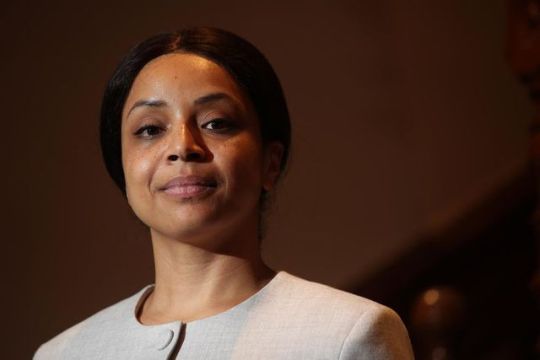
MEET THE BLACK LAWYER ON A MISSION TO EXPUNGE THE CANNABIS CONVICTIONS OF HALF A MILLION CANADIANS
On the surface, Annamaria Enenajor was an unlikely candidate to become the face of cannabis legalization reform in Canada.
But as Canada edged towards decriminalizing marijuana, it was frequently Enenajor, as founder and campaign director of Cannabis Amnesty, on the airwaves pushing for the deletion of criminal records for the half-million Canadians with simple possession convictions.
“I think it’s hilarious,” the Toronto criminal defence lawyer says of her leap from strait-laced legal eagle to passionate pot advocate. “I had this joke when I first started Cannabis Amnesty that marijuana was as significant in my life as oregano, an herb I thought about occasionally and didn’t really use.”
As incongruous as it might initially appear, Enenajor’s path makes perfect sense. A zeal for social justice, combined with a determined focus to confront systemic racism, weaves through her life and a career arc that finds her now, at only 34, a partner in one of Toronto’s high-profile law firms and an emerging champion of legal reform.
That passion to give voice to the often voiceless was evident when she was part of a team representing prisoners at Rikers Island in a civil-rights class action against New York City to end the use of excessive force. It was evident when, also in New York, she represented LGBT asylum-seekers, and staffed a legal clinic for Hispanic immigrants in the Bronx. And when she volunteered at a New Delhi human rights documentation centre, monitoring refugees in India.
And it drives her work on the cannabis project. The government has proposed pardoning those with convictions, technically called a record suspension, but those records would still exist. Enenajor continues to rally support to have those lingering files completely expunged.
“Having come from a critical social science background which I tried to apply in law school, I had a strong understanding of how drug prosecutions in general were disproportionately meted out against vulnerable members of society, Indigenous people, people of colour, people with addictions,” she explains.
“That’s been sort of what drew me to criminal law as well. The fact that our criminal justice system tends to put away those people who are the most vulnerable, not necessarily those who are the worst members of society.”
That sensitivity in her approach to the law is what prompted the powerhouse boutique firm headed by Clayton Ruby and Brian Shiller to name Enenajor a partner last year. She was only 33 and had been with the firm since 2015.
“It is incredibly young,” acknowledges Ruby. “But she’s got the qualities we want; not just excellence and skills — I mean she clerked for the present Chief Justice of Canada — but mostly that sense of commitment to change. Somewhere along the line, she decided she was not going to just do great lawyering, because she can go down to the corporate world and make a lot more money doing it. She decided she really wanted to make the world a better place. That’s what makes her appropriate for us.”
While that might sound Pollyannaish, Enenajor’s compassionate approach not only peppers her resumé, it is evident in her voice. As she reflects on her career, sitting in her office on the second floor of a repurposed Victorian house on Isabella St., her words sometimes crack with emotion. That tremor is there when she recalls the concentration of “Black men in cages” in the New York penal system and it surfaces again when discussing the “devastating mental health implications” that overzealous policing and detention have on the marginalized.
That humanistic perspective can be traced back to her youth and the influence of her parents.
The daughter of a Black Nigerian father and a white Slovak mother, Enenajor moved from Slovakia to Edmonton when she was 6. There, her mother studied Slavic linguistics but when her student visa expired two years later, the family relocated to Nigeria.
Enenajor says her father, Gilbert, a doctor, had been active in student organizations, and on his return he started a hospital and tried to bring improved medical care to poor communities.
Annamaria’s mother, Anna, was a religious woman who put a strong emphasis on the “preferential option for the poor” principle, which stresses ensuring the well-being of society’s downtrodden and powerless.
Enenajor inherited the sympathetic tendencies of both.
“I was a very strong Catholic until probably about my mid-20s and then as I drifted away, the accoutrements and rituals of the church disappeared but that sense of justice and the beatitudes — like blessed are the poor, the weak and the humble — always stayed with me,” she says.
“The highest aspiration as a human is to serve others and to do so with love. There’s this great quote from (philosopher) Dr. Cornel West and he says ‘Never forget that justice is what love looks like in public.’ ”
When Annamaria was 10, the family moved back to Canada, settling in the Don Mills and Sheppard area of Toronto, a neighbourhood she recalls as a “happy bubble of multiculturalism.”
While her mother first worked teaching high school equivalency courses at the Mimico Correctional Centre, her dad spent his early days mostly at the Fairview Library. Gilbert had been a pediatrician in Nigeria and he was studying to be a licensed physician in Canada. Annamaria was often at his side doing her homework and surrounded by books that brought the world to her. Even as a preteen Gilbert recalls his daughter taking an interest in international affairs, politics and religion. She also had the un-childlike ability to sit and read for hours.
“She was a very inquisitive child,” Gilbert recalls.
Gilbert says he and Anna tried to shelter their three children from racism so they would “grow up to love everybody” and view everyone as equal, but even the cocoon of family life isn’t a completely protective bubble wrap.
“When she started to see how (some minorities) were treated, she said there’s no way you can say there’s no racism.”
Seeing discrimination, Gilbert believes, planted the desire in his daughter “to defend things that are not right.”
Annamaria remembers being bullied her in Edmonton school where she and her sister “were pretty much the only Black kids, and when I say Black, we’re half-Black.”
She thought it remarkably shallow that someone would judge another based solely on the pigment of their skin.
“That really instilled in me how devastating racism can be because it diminishes your sense of self-worth,” she says. “When you have a diminished sense of self-worth, there is no need for you to be a contributing member of society. So that’s what has always stood out to me as being incredibly toxic about racism.”
Once the family was in Toronto, Enenajor came to understand, even as a high schooler, that visible minorities were treated more harshly by institutions such as the police; she inherently understood she was subject to different expectations. It informed her behaviour.
“I would not touch drugs at all because I knew that if I were to make that mistake it would follow me for the rest of my life,” she says. “I had internalized this knowledge that I would be scrutinized more by the police or by authorities than my peers who were not of a minority background.”
A Toronto Star investigation in 2017 revealed that Black people with no criminal convictions were three times more likely to be arrested for marijuana possession than white people. Consumption rates tend to be the same between the two groups.
Enenajor immersed herself in schoolwork with a drive much like that of her parents. Her dad ultimately did become a Canadian doctor while her mom progressed to be a school administrator.
Upon graduation from St. Joseph’s Morrow Park Catholic Secondary School, Enenajor earned a prestigious $100,000 Loran Scholarship, from a foundation supporting Canada’s future leaders. Even with that, she considered devoting herself to religious works as a nun.
“She said, ‘I just feel I want to go help people. I want to go and feed refugees,’” recalls Gilbert. Neither parent was pleased with this apparent change in plan.
“There was an intervention,” says Enenajor.
Enenajor went to school and put together the resumé of a classic overachiever.
Enenajor aced everything she studied, graduating from the University of Toronto as the top student in international relations, which she had mixed with courses in Christianity and culture. Then she earned a Master’s degree in forced migration from the Refugee Studies Centre at the University of Oxford. That took her to New Delhi as a volunteer monitoring the rights of refugees.
Then her rapid progress hit a speed bump.
Enenajor returned to Canada to study law at McGill University and, for the first time, she struggled with the subject matter. She met an academic counsellor and was told “law school isn’t for everyone.”
An angry Enenajor adopted an I’ll-show-you attitude.
“I was always a very, very serious student. My parents instilled that in me,” she says. “Education is very important. It’s how you get yourself out of poverty. It’s how you make a name for yourself. It’s how you ensure your income. It’s how you participate in society. You have to become educated. No one can take that away from you.”
She ultimately graduated with civil and common law degrees and was awarded the David L. Johnson gold medal for highly distinguished standing while contributing to the academic, social and community life at the school in an outstanding manner. She served as vice-president of the Black Law Students’ Association of McGill, as a legal researcher at the McGill International Criminal Justice Clinic and she volunteered off campus as a math tutor in low-income neighbourhoods.
In 2012, she was hired to be a law clerk with the Supreme Court of Canada.
“She had this concern for fairness,” recalls Richard Wagner, now the chief justice, of the woman he calls “one of my best clerks.”
“Every time I would talk to her about any issues, not only the legal issues in our files but other social issues, you could sense that she had this sensitivity. She was sensitive to the human condition and to do the right thing and the fair thing.”
While it was her fascination with the O.J. Simpson trial as an 11-year-old that first gave her the idea that a law career might be an interesting life, it was her work on behalf of the Rikers Island inmates, after that Supreme Court experience, that pushed her to become a criminal defence attorney.
During her work at the massive New York firm Ropes & Gray, she was exposed to one of America’s notorious prison complexes. She catalogued the use-of-force incidents and she was stunned by how coldly the suffering was recounted in the records, even if a prisoner had been beaten so badly he lost an eye or suffered hearing loss. She was also troubled that there were men lingering in jail who hadn’t been convicted.
“It was almost like these aren’t humans,” she says.
Enenajor says their treatment made her despair.
“We pride ourselves as a western civilization as being progressive, and we have humans in chains for having done something that doesn’t warrant it. I thought it was so shameful, I felt I had to so something about it.
“It’s the prison system that turned me on to criminal defence because the stakes are so high.”
Enenajor maintained a busy pro bono practice in New York, which helped develop her skills. She loved the firm but yearned for something more.
“Should I spend the rest of my life making sure this billionaire gets enough millions from this billionaire?”
Enenajor took a “substantial pay cut” to return to Toronto, signing on with what is now Ruby Shiller Enenajor DiGiuseppe. She says both Ruby and Shiller encourage her to speak publicly about legal issues that concern her, particularly when the perspective of a woman or person of colour is missing.
While she’s been spending about 30 per cent of her time on the cannabis file, her day planner is full of the typical cases undertaken by a defence attorney: sex assaults, obstruction of a peace officer, assault with a weapon, living off the avails of prostitution, attempted murder. She anticipates being in court for a murder trial in February.
She concedes that most of her life is consumed by work but she does periodically get away to the Bahamas to attend a holistic yoga retreat. She is hoping to go for an entire month sometime soon.
“I keep saying I’m trying to change that (work/life balance) but it just never happens. I keep saying next month, I’ll work out more and I’ll try to go out more.”
Single, Enenajor lives on the top floor of her family’s home, moving in after she found living alone in a downtown apartment “just horrible mentally.”
Almost each workday, she has lunch at a restaurant with Ruby, akin to having her own personal Yoda.
“I always come with questions about my cases and say, look, this is what I’m dealing with, this is the kind of strategy I want to use. What do you think of this theory of the case? What do you think of this line of reasoning? This case law?
“They are always fantastic ideas I get from him … That’s why I don’t make a big stink about the fact I’ve gained 20 pounds since coming.”
Enenajor struggled with anxiety in law school and early in her career — fighting off doubts that she was good enough — but weekly therapy sessions have helped keep it “very well managed.” So does intense preparation before a court appearance.
“I can’t remember the last time it manifested itself,” she says.
Cannabis, even legal, is not something she’ll use to help with the issue.
“I’m into mindfulness meditation,” she says. “So I try not to take mind-altering substances.”
She has tried CBD, the non-psychoactive cannabis compound that some use for anxiety control and other medical benefits. Enenajor found it had little impact. As for marijuana containing THC, the ingredient that causes a high, she tried it twice and lost interest.
The first was during law school. She’d been surprised as she moved through her post-secondary education at how casual drug use was among students from wealthier backgrounds and how they showed no fear of begin stopped by police, frisked and arrested. It was a different world from her teenage years. Enenajor, a non-smoker, gave it a whirl, had difficulty inhaling and found “it did nothing.”
The second time was a few years ago on a visit to the Bob Marley Museum in Jamaica when the tour guide told her the property was covered by a constitutional exemption.
“I went with the flow. I took a brownie,” she recalls. Like the first time, she noticed no impact.
“So I took another one. An hour later, pfff,” she says, blowing air through her lips. “It was a terrible experience. It was just like the feeling of being very drunk, like being too drunk. You start feeling anxious (with) poor memory, poor co-ordination. Thank goodness I was there with my partner at the time and he was able to take care of me.”
Although she’s not finished with the cannabis file, Enenajor’s extra-curricular work will also focus on both prison reform and trying to improve the criminal justice system, particularly from the perspective of race.
“There’s systematic racism and historical injustices that play into outcomes that we still need to acknowledge,” she says, noting that “a lot of my experience in criminal justice has seen how law amplifies inequalities in many ways and is a disservice to people. It is an impediment to them improving their lot in life and it’s an impediment to them getting the kind of help they need.”
Enenajor feels there is an appetite for change and “a space for someone like myself to make those kinds of arguments and to make them in a compelling way to bring about reform.”
Enenajor recently sat on a panel at a Toronto region judges conference to speak on how to apply social context in the sentencing of African-Canadian offenders.
“One of the factors that a judge should take into consideration in sentencing a person is moral blameworthiness,” she says. “How morally blameworthy is an individual who has their choices limited by life’s circumstances?
“It was very well received. I was happy.”
As for prison reform, federal Public Safety Minister Ralph Goodale recently drafted Bill C-83 that the government says would effectively, eliminate solitary confinement. While it is progress, Enenajor questions why many prisoners are incarcerated at all.
“I think we overuse prisons,” she says. “I would call myself a prison abolitionist because I think that we structure our system as if the logical outcome of every case where there’s a guilty finding is prison. I think it should be structured as a last resort for people who are the most dangerous and need to be separated from society.”
She finds it particularly reprehensible that people with addictions or mental illness end up behind bars.
Enenajor says that while she was growing up, her value and self-worth were constantly reinforced by her parents and her teachers so she understood what she could go on to accomplish in life “had nothing to do with my background or skin colour. It’s all about who I am as a person.”
But she came to understand that some people of colour “are unable to do that because they’ve internalized that hatred that society has, those stereotypes and those doubts that society puts on you.”
That can sometimes lead to low self-esteem and choices that can, in turn, lead to involvement with the criminal system.
She believes all Canadians have an obligation to act when they see the system isn’t working for some.
Enenajor’s rapid ascent to partner — something she notes is easier in a small firm — has strengthened the potential for her to a leader in this belief.
When Enenajor became a partner at Ruby Shiller, she was so thrilled, she took a photo of the masthead with her name on it and sent it to her parents. She couldn’t help herself.
“It’s beyond my wildest dreams that I’m a partner,” she says.
“I’ve gone through incredibly stressful periods and worked with clients whose lives are on the line, and there have been difficult ethical decisions I’ve had to make and horror stories. None of that stress can compare to the stress of having the feeling that I was not doing what I was put on this earth to do. Being able to find that is such an incredible blessing.”
This article originally appeared in the Toronto Star, written by Paul Hunter.
Paul Hunter is a reporter and feature writer based in Toronto. Follow him on Twitter: @hunterhockey
0 notes
Text
Sickening, gruelling or frightful: how doctors measure pain | John Walsh
The Long Read: Suffering is difficult to describe and impossible to see. So how can doctors tell how much it hurts?
One night in May, my wife sat up in bed and said, Ive got this awful pain just here. She prodded her abdomen and made a face. It feels like somethings really wrong. Woozily noting that it was 2am, I asked what kind of pain it was. Like somethings biting into me and wont stop, she said.
Hold on, I said blearily, help is at hand. I brought her a couple of ibuprofen with some water, which she downed, clutching my hand and waiting for the ache to subside.
An hour later, she was sitting up in bed again, in real distress. Its worse now, she said, really nasty. Can you phone the doctor? Miraculously, the family doctor answered the phone at 3am, listened to her recital of symptoms and concluded, It might be your appendix. Have you had yours taken out? No, she hadnt. It could be appendicitis, he surmised, but if it was dangerous youd be in much worse pain than youre in. Go to the hospital in the morning, but for now, take some paracetamol and try to sleep.
Barely half an hour later, the balloon went up. She was awakened for the third time, but now with a pain so savage and uncontainable it made her howl. The time for murmured assurances and spousal procrastination was over. I rang a local minicab, struggled into my clothes, bundled her into a dressing gown, and we sped to St Marys Paddington at just before 4am.
The flurry of action made the pain subside, if only through distraction, and we sat for hours while doctors brought forms to be filled, took her blood pressure and ran tests. A registrar poked a needle into my wifes wrist and said, Does that hurt? Does that? How about that? before concluding: Impressive. You have a very high pain threshold.
The pain was from pancreatitis, brought on by rogue gallstones that had escaped from her gall bladder and made their way, like fleeing convicts, to a refuge in her pancreas, causing agony. She was given a course of antibiotics and, a month later, had an operation to remove her gall bladder.
Its keyhole surgery, said the surgeon breezily, so youll be back to normal very soon. Some people feel well enough to take the bus home after the operation. His optimism was misplaced. My wife came home the following day filled with painkillers. When they wore off, she writhed with suffering. After three days she rang the specialist, only to be told: Its not the operation thats causing discomfort its the air that was pumped inside you to separate the organs before surgery. Once the operation had proved a success, the surgeons had apparently lost interest in the fallout.
During that period of convalescence, as I watched her grimace and clench her teeth and let slip little cries of anguish until a long regimen of combined ibuprofen and codeine finally conquered the pain, several questions came into my head. Chief among them was: Can anyone in the medical profession talk about pain with any authority? From the family doctor to the surgeon, their remarks and suggestions seemed tentative, generalised, unknowing and potentially dangerous: Was it right for the doctor to tell my wife that her level of pain didnt sound like appendicitis when the doctor didnt know whether she had a high or low pain threshold? Should he have advised her to stay in bed and risk her appendix exploding into peritonitis? How could surgeons predict that patients would feel only discomfort after such an operation when she felt agony an agony that was aggravated by fear that the operation had been a failure?
I also wondered if there were any agreed words that would help a doctor understand the pain felt by a patient. I thought of my father, a GP in the 1960s with an NHS practice in south London, who used to marvel at the colourful pain symptoms he heard: Its like Ive been attacked with a stapler; Like having rabbits running up and down my spine; Its like someones opened a cocktail umbrella in my penis Few of them, he told me, corresponded to the symptoms listed in a medical textbook. So how should he proceed? By guesswork and aspirin?
There seemed to be a chasm of understanding in human discussions of pain. I wanted to find out how the medical profession apprehends pain the language it uses for something thats invisible to the naked eye, that cant be measured except by asking for the sufferers subjective description, and that can be treated only by the use of opium derivatives that go back to the middle ages.
When investigating pain, the basic procedure for clinics everywhere is to give a patient the McGill pain questionnaire. Developed in the 1970s by two scientists, Dr Ronald Melzack and Dr Warren Torgerson, both of McGill University in Montreal, it is still the main tool for measuring pain in clinics worldwide.
Melzack and his colleague Dr Patrick Wall of St Thomas Hospital in London had already galvanised the field of pain research in 1965 with their seminal gate control theory, a ground-breaking explanation of how psychology can affect the bodys perception of pain. In 1984, the pair went on to write Wall and Melzacks Textbook of Pain, the most comprehensive reference work in pain medicine. It has gone through five editions and is currently more than 1,000 pages long.
In the early 1970s, Melzack began to list the words patients used to describe their pain and classified them into three categories: sensory (which included heat, pressure, throbbing or pounding sensations), affective (which related to emotional effects, such as tiring, sickening, gruelling or frightful) and lastly evaluative (evocative of an experience from annoying and troublesome to horrible, unbearable and excruciating).
You dont have to be a linguistic genius to see there are shortcomings in this range of terms. For one thing, some words in the affective and evaluative categories seem interchangeable theres no difference between frightful in the former and horrible in the latter, or between tiring and annoying and all the words share an unfortunate quality of sounding like a duchess complaining about a ball that didnt meet her standards.
But Melzacks grid of suffering formed the basis of what became the McGill pain questionnaire. The patient listens as a list of pain descriptors is read out and has to say whether each word describes their pain and, if so, to rate the intensity of the feeling. The clinicians then look at the questionnaire and put check marks in the appropriate places. This gives the clinician a number, or a percentage figure, to work with in assessing, later, whether a treatment has brought the patients pain down (or up).
A more recent variant is the National Initiative on Pain Controls pain quality assessment scale (PQAS), in which patients are asked to indicate, on a scale of 1 to 10, how intense or sharp, hot, dull, cold, sensitive, tender, itchy, etc their pain has been over the past week.
The trouble with this approach is the imprecision of that scale of 1 to 10, where a 10 would be the most intense pain sensation imaginable. How does a patient imagine the worst pain ever and give their own pain a number? Some men may find it hard to imagine anything more agonising than toothache or a tennis injury. Women who have experienced childbirth may, after that experience, rate everything else as a 3 or 4.
I asked some friends what they thought the worst physical pain might be. Inevitably, they just described nasty things that had happened to them. One man nominated gout. He recalled lying on a sofa, with his gouty foot resting on a pillow, when a visiting aunt passed by; the chiffon scarf she was wearing slipped from her neck and lightly touched his foot. It was unbearable agony.
A brother-in-law nominated post-root-canal toothache unlike muscular or back pain, he said, it couldnt be alleviated by shifting your posture. It was relentless. A male friend confided that a haemorrhoidectomy had left him with irritable bowel syndrome, in which a daily spasm made him feel as if somebody had shoved a stirrup pump up my arse and was pumping furiously. The pain was, he said, boundless, as if it wouldnt stop until I exploded. A woman friend recalled the moment the hem of her husbands trouser leg snagged on her big toe, ripping the nail clean off. She used a musical analogy to explain the effect: Id been through childbirth, Id broken my leg and I recalled them both as low moaning noises, like cellos; the ripped-off nail was excruciating, a great, high, deafening shriek of psychopathic violins, like nothing Id heard or felt before.
It seems a shame that these eloquent descriptions are reduced by the McGill questionnaire to words like throbbing or sharp, but its function is simply to give pain a number a number that will, with luck, be decreased after treatment, when the patient is reassessed.
This procedure doesnt impress Professor Stephen McMahon of the London Pain Consortium, an organisation formed in 2002 to promote internationally competitive research into pain. There are lots of problems that come with trying to measure pain, he says. I think the obsession with numbers is an oversimplification. Pain is not unidimensional. It doesnt just come with scale a lot or a little it comes with other baggage: how threatening it is, how emotionally disturbing, how it affects your ability to concentrate. The measuring obsession probably comes from the regulators who think that, to understand drugs, you have to show efficacy. And the American Food and Drug Administration dont like quality-of-life assessments; they like hard numbers. So were thrown back on giving it a number and scoring it. Its a bit of a wasted exercise because its only one dimension of pain that were capturing.
Illustration: Matthew Richardson
Pain can be either acute or chronic, and the words do not (as some people think) mean bad and very bad. Acute pain means a temporary or one-off feeling of discomfort, which is usually treated with drugs; chronic pain persists over time and has to be lived with as a malevolent everyday companion. But because patients build up a resistance to drugs, other forms of treatment must be found for it.
The Pain Management and Neuromodulation Centre at Guys and St Thomas Hospital in central London is the biggest pain centre in Europe. Heading the team there is Dr Adnan Al-Kaisy, who studied medicine at the University of Basrah, Iraq, and later worked in anaesthetics at specialist centres in England, the US and Canada.
Id say that 55 to 60% of our patients suffer from lower back pain, he says. The reason is, simply, that we dont pay attention to the demands life makes on us, the way we sit, stand, walk and so on. We sit for hours in front of a computer, with the body putting heavy pressure on small joints in the back. Al-Kaisy reckons that in the UK the incidence of chronic lower back pain has increased substantially in the last 15 to 20 years, and that the cost in lost working days is about 6 to 7 billion.
Elsewhere the clinic treats those suffering from severe chronic headaches and injuries from accidents that affect the nervous system.
Do they still use the McGill questionnaire? Unfortunately yes, says Al-Kaisy. Its a subjective measurement. But pain can be magnified by a domestic argument or trouble at work, so we try to find out about the patients life their sleeping patterns, their ability to walk and stand, their appetite. Its not just the patients condition, its also their environment.
The challenge is to transform this information into scientific data. Were working with Professor Raymond Lee, chair of Biomechanics at the South Bank University, to see if there can be objective measurement of a patients disability due to pain, he says. Theyre trying to develop a tool, rather like an accelerometer, which will give an accurate impression of how active or disabled they are, and tell us the cause of their pain from the way they sit or stand. Were really keen to get away from just asking the patient how bad their pain is.
Some patients arrive with pains that are far worse than backache and require special treatment. Al-Kaisy describes one patient let us call him Carter who suffered from a terrible condition called ilioinguinal neuralgia, a disorder that produces a severe burning and stabbing pain in the groin. Hed had an operation in the testicular area, and the inguinal nerve had been cut. The pain was excruciating: when he came to us, he was on four or five different medications, opiates with very high dosages, anticonvulsive medication, opioid patches, paracetamol and ibuprofen on top of that. His life was turned upside down, his job was on the line. The utterly stricken Carter was to become one of Al-Kaisys big successes.
Since 2010, Guys and St Thomas has offered a residential programme for adults whose chronic pain hasnt responded to treatment at other clinics. The patients come in for four weeks, away from their normal environment, and are seen by a motley crew of psychologists, physiotherapists, occupational health specialists and nursing physicians who between them devise a programme to teach them strategies for managing their pain.
Many of these strategies come under the heading of neuromodulation, a term you hear a lot in pain management circles. In simple terms, it means distracting the brain from constantly brooding on the pain signals it is getting from the bodys periphery. Sometimes the distraction is a cunningly deployed electric shock.
We were the first centre in the world to pioneer spinal cord stimulation, says Al-Kaisy. In pain occasions, overactive nerves send impulses from the periphery to the spinal cord and from there to the brain, which starts to register pain. We try to send small bolts of electricity to the spinal cord by inserting a wire in the epidural area. Its only one or two volts, so the patient feels just a tingling sensation over where the pain is, instead of feeling the actual pain. After two weeks, we give the patient an internal power battery with a remote control, so he can switch it on whenever he feels pain and carry on with his life. Its essentially a pacemaker that suppresses the hyperexcitability of nerves by delivering subthreshold stimulation. The patient feels nothing except his pain going down. Its not invasive we usually send patients home the same day.
When Carter, suffering from agonising pain in the groin, had failed to respond to any other treatments, Al-Kaisy tried his new combination of therapies. We gave him something called a dorsal root ganglion stimulation. Its like a small junction-box, placed just underneath one of the bones of the spine. It makes the spine hyperexcited, and sends impulses to the spinal cord and the brain. I pioneered a new technique to put a small wire into the ganglion, connected to an external power battery. Over 10 days the intensity of pain went down by 70% by the patients own assessment. He wrote me a very nice email saying I had changed his life, that the pain had just stopped completely, and that he was coming back to normality. He said his job was saved, as was his marriage, and he wanted to go back to playing sport. I told him, Take it easy. You mustnt start climbing the Himalayas just yet. Al-Kaisy beams. This is a remarkable outcome. You cannot get it from any other therapies.
The greatest recent breakthrough in assessing pain, according to Professor Irene Tracey, head of the University of Oxfords Nuffield Department of Clinical Neurosciences, has been the understanding that chronic pain is a thing in its own right. She explains: We always thought of it as acute pain that just goes on and on and if chronic pain is just a continuation of acute pain, lets fix the thing that caused the acute and the chronic should go away. That has spectacularly failed. Now we think of chronic pain as a shift to another place, with different mechanisms, such as changes in genetic expression, chemical release, neurophysiology and wiring. Weve got all these completely new ways of thinking about chronic pain. Thats the paradigm shift in the pain field.
Tracey has been called the Queen of Pain by some media commentators. She was, until recently, the Nuffield Professor of anaesthetic science and is an expert in neuroimaging techniques that explore the brains responses to pain. Despite her nickname, in person she is far from alarming: a bright-eyed, enthusiastic, welcoming and hectically fluent woman of 50, she talks about pain at a personal level. She has no problem defining the ultimate pain that scores 10 on the McGill questionnaire: Ive been through childbirth three times, and my 10 is a very different 10 from before I had kids. Ive got a whole new calibration on that scale. But how does she explain the ultimate pain to people who havent experienced childbirth? I say, Imagine youve slammed your hand in a car door thats 10.
She uses a personal example to explain the way perception and circumstance can alter the way we experience pain, as well as the phenomenon of hedonic flipping, which can convert pain from an unpleasant sensation into something you dont mind. I did the London Marathon this year. It needs a lot of training and running and your muscles ache, and next day youre really in pain, but its a nice pain. Im no masochist, but I associate the muscle pain with thoughts like, I did something healthy with my body, Im training, and Its all going well.
I ask her why there seems to be a gap between doctors and patients apprehension of pain. Its very hard to understand, because the system goes wrong from the point of injury, along the nerve thats taken the signal into the spinal cord, which sends signals to the brain, which sends signals back, and it all unravels with terrible consequential changes. So my patient may be saying, Ive got this excruciating pain here, and Im trying to see where its coming from, and theres a mismatch here because you cant see any damage or any oozing blood. So we say, Oh come now, youre obviously exaggerating, it cant be as bad as that. Thats wrong its a cultural bias we grew up with, without realising.
Recently, she says, there has been a breakthrough in understanding about how the brain is involved in pain. Neuroimaging, she explains, helps to connect the subjective pain with the objective perception of it. It fills that space between what you can see and whats being reported. We can plug that gap and explain why the patient is in pain even though you cant see it on your x-ray or whatever. Youre helping to bring truth and validity to these poor people who are in pain but not believed.
But you cant simply see pain glowing and throbbing on the screen in front of you. Brain imaging has taught us about the networks of the brain and how they work, she says. Its not a pain-measuring device. Its a tool that gives you fantastic insight into the anatomy, the physiology and the neurochemistry of your body and can tell us why you have pain, and where we should go in and try to fix it.
Some of the ways in, she says, are remarkably direct and mechanical like Al-Kaisys spinal cord stimulation wire. There are now devices you can attach to your head and allow you to manipulate bits of the brain. You can wear them like bathing caps. Theyre portable, ethically allowed brain-simulation devices. Theyre easy for patients to use and evidence is coming, in clinical trials, that they are good for strokes and rehabilitation. Theres a parallel with the games industry, where theyre making devices you can put on your head so kids can use thought to move balls around. The games industry is, for fun, driving this idea that when you use your brain, you generate electrical activities. Theyre developing the technology really fast, and we can use it in medical applications.
Illustration: Matthew Richardson
Pain has become a huge area of medical research in the US, for a simple reason. Chronic pain affects over 100 million Americans and costs the country more than half a trillion dollars a year in lost working hours, which is why it has become a magnet for funding by big business and government.
Researchers at the Human Pain Research Laboratory at Stanford University, California, are working to gain a better understanding of individual responses to pain so that treatments can be more targeted. The laboratory has several study initiatives on the go into migraine, fibromyalgia, facial pain and other conditions but its largest is into back pain. It has been endowed with a $10m grant from the National Institutes of Health to study non-drug alternative treatments for lower back pain. The specific treatments are mindfulness, acupuncture, cognitive behavioural therapy and real-time neural feedback.
They plan to inspect the pain tolerance of 400 people over five years of study, ranging from pain-free volunteers to the most wretched chronic sufferers who have been to other specialists but found no relief. The idea is to find peoples mid-range tolerance (theyre asked to rate their pain while they are experiencing it), to establish a usable baseline. They then are given the non-invasive treatments such as mindfulness and acupuncture and are subjected afterwards to the same pain stimuli, to see how their pain tolerance has changed from their baseline reading. MRI scanning is used on the patients in both laboratory sessions, so that clinicians can see and draw inferences from the visible differences in blood flow to different parts of the brain.
A remarkable feature of the assessment process is that patients are also given scores for psychological states: a scale measures their level of depression, anxiety, anger, physical functioning, pain behaviour and how much pain interferes with their lives. This should allow physicians to use the information to target specific treatments. All these findings are stored in an informatics platform called Choir, which stands for the Collaborative Health Outcomes Information Registry. It has files on 15,000 patients, 54,000 unique clinic visits and 40,000 follow-up meetings.
The big chief at the Human Pain Research Laboratory is Dr Sean Mackey, Redlich professor of anaesthesiology, perioperative and pain medicine, neurosciences and neurology at Stanford. His background is in bioengineering, and under his governance the Stanford Pain Management Center has twice been designated a centre of excellence by the American Pain Society. A tall, genial, easy-going man, he is sometimes approached by legal firms who want him to appear in court to state definitively whether their client is or is not in chronic pain (and therefore justified in claiming absentee benefit). His response is surprising.
In 2008, I was asked by a law firm to speak in an industrial injury case in Arizona. This poor guy got hot burning asphalt sprayed on his arm at work; he had a claim of burning neuropathic pain. The plaintiffs side brought in a cognitive scientist, who scanned his brain and said there was conclusive evidence that he had chronic pain. The defence asked me to comment, and I said, Thats hogwash, we cannot use this technology for that purpose.
Shortly afterwards, I gave a talk on pain, neuroimaging and the law, explaining why you cant do this because theres too much individual variability in pain, and the technology isnt sensor-specific enough. But I concluded by saying, If you were to do this, youd use modern machine-learning approaches, like those used for satellite reconnaissance to determine whether a satellite is seeing a tank or a civilian truck. Some of my students said, Can you give us some money to try this? I said, Yes, but it cant be done. But they designed the experiment and discovered that, using brain imagery, they could predict with 80% accuracy whether someone was feeling heat pain or not.
Mackey finally published a paper about the experiment. So did his findings influence any court decisions? No. I get asked by attorneys, and I always say, There is no place for this in the courtroom in 2016 and there wont be in 2020. People want to push us into saying this is an objective biomarker for detecting that someones in pain. But the research is in carefully controlled laboratory conditions. You cannot generalise about the population as a whole. I told the attorneys, This is too much of a leap. I dont think theres a lot of clinical utility in having a pain-o-meter in a court or in most clinical situations.
Mackey explains the latest thinking about what pain actually is. Now we understand that pain is a balance between ascending information coming from our bodies and descending inhibitory systems from our brains. We call the ascending information nociception from the Latin nocere, to harm or hurt meaning the response of the sensory nervous system to potentially harmful stimuli coming from our periphery, sending signals to the spinal cord and hitting the brain with the perception of pain. The descending systems are inhibitory, or filtering, neurons, which exist to filter out information thats not important, to turn down the ascending signals of hurt. The main purpose of pain is to be the great motivator, to tell you to pay attention, to focus. When the pain lab was started, we had no way of addressing these two dynamic systems, and now we can.
Mackey is immensely proud of his massive CHOIR database which records peoples pain tolerance levels and how they are affected by treatment and has made it freely available to other pain clinics as a community source platform, collaborating with academic medical centres nationwide so that a rising tide elevates all boats. But he is also humble enough to admit that science cannot tell us which are the sites of the bodys worst pains.
Back pain is the most reported pain at 28%, but I know theres a higher density of nerve fibres in the hands, face, genitals and feet than in other areas, Mackey says, and there are conditions where the sufferer has committed suicide to get away from the pain. Things like post-herpetic neuralgia, that burning nerve pain that occurs after an outbreak of shingles and is horrific; another is cluster headaches some patients have thought about taking a drill to their heads to make it stop.
Like Irene Tracey, Mackey is enthusiastic about the rise of transcranial magnetic stimulation (Imagine hooking a nine-volt battery across your scalp) but, when asked about his particular successes, he talks about simple solutions. Early on in my career, I used to be very focused on the peripheral, the apparent site of the pain. I was doing interventions, and some people would get better but a lot wouldnt. So I started listening to their fears and anxieties and working on those, and became very brain-focused. I noticed that if you have a nerve trapped in your knee, your whole leg could be on fire, but if you apply a local anaesthetic there, it could abolish it.
This young woman came to me with a terrible burning sensation in her hand. It was always swollen; she couldnt stand anyone touching it because it felt like a blowtorch. Mackey noticed that she had a post-operative scar from prior surgery for carpal-tunnel syndrome. Speculating that this was at the root of her problem, he injected botulinum toxin, a muscle relaxant, at the site of the scar. A week later, she came up and gave me this huge hug and said, I was able to pick up my child for the first time in two years. I havent been able to since she was born. All the swelling was gone. It taught me that its not all about the body part, and not all about the brain. Its about both.
Main illustration by Matthew Richardson
This is an edited version of an article that appears on Mosaic. It is republished here under a Creative Commons licence.
Follow the Long Read on Twitter at @gdnlongread, or sign up to the long read weekly email here.
Read more: http://ift.tt/2jcWboW
from Sickening, gruelling or frightful: how doctors measure pain | John Walsh
0 notes
Text
Measuring pain: How much does it hurt?
reader comments
How can doctors measure pain? For
Mosaic
, John Walsh finds out about new ways of assessing the agony. His
story
is republished here under a Creative Commons license.
One night in May, my wife sat up in bed and said, “I’ve got this awful pain just here.” She prodded her abdomen and made a face. “It feels like something’s really wrong.” Woozily noting that it was 2am, I asked what kind of pain it was. “Like something’s biting into me and won’t stop,” she said.
“Hold on,” I said blearily, “help is at hand.” I brought her a couple of ibuprofen with some water, which she downed, clutching my hand and waiting for the ache to subside.
An hour later, she was sitting up in bed again, in real distress. “It’s worse now,” she said, “really nasty. Can you phone the doctor?” Miraculously, the family doctor answered the phone at 3am, listened to her recital of symptoms and concluded, “It might be your appendix. Have you had yours taken out?” No, she hadn’t. “It could be appendicitis,” he surmised, “but if it was dangerous you’d be in much worse pain than you’re in. Go to the hospital in the morning, but for now, take some paracetamol and try to sleep.”
Barely half an hour later, the balloon went up. She was awakened for the third time, but now with a pain so savage and uncontainable it made her howl like a tortured witch facedown on a bonfire. The time for murmured assurances and spousal procrastination was over. I rang a local minicab, struggled into my clothes, bundled her into a dressing gown, and sped to St. Mary’s Paddington just before 4am.
Like Mosaic stories?
From time to time, Ars has republished the work of Mosaic (under Creative Commons) on everything from what happens to the body after death to insects as the future of food. Now, we're helping them with a study to understand people’s views about science-related articles, and we would appreciate your opinion. If you’d like to be part of this online survey, please click here.
The flurry of action made the pain subside, if only through distraction, and we sat for hours while doctors brought forms to be filled, took her blood pressure and ran tests. A registrar poked a needle into my wife’s wrist and said, “Does that hurt? Does that? How about that?” before concluding: “Impressive. You have a very high pain threshold.”
The pain was from pancreatitis, brought on by rogue gallstones that had escaped from her gall bladder and made their way, like fleeing convicts, to a refuge in her pancreas, causing agony. She was given a course of antibiotics and, a month later, had an operation to remove her gall bladder.
“It’s keyhole surgery,” said the surgeon breezily, “so you’ll be back to normal very soon. Some people feel well enough to take the bus home after the operation.” His optimism was misplaced. My lovely wife, she of the admirably high pain threshold, had to stay overnight, and came home the following day filled with painkillers; when they wore off, she writhed with suffering. After three days she rang the specialist, only to be told: “It’s not the operation that’s causing discomfort—it’s the air that was pumped inside you to separate the organs before surgery.” Like all too many surgeons, they had lost interest in the fallout once the operation had proved a success.
During that period of convalescence, as I watched her grimace and clench her teeth and let slip little cries of anguish until a long regimen of combined ibuprofen and codeine finally conquered the pain, several questions came into my head. Chief among them was: Can anyone in the medical profession talk about pain with any authority? From the family doctor to the surgeon, their remarks and suggestions seemed tentative, generalised, unknowing—and potentially dangerous: Was it right for the doctor to tell my wife that her level of pain didn’t sound like appendicitis when the doctor didn’t know whether she had a high or low pain threshold? Should he have advised her to stay in bed and risk her appendix exploding into peritonitis? How could surgeons predict that patients would feel only ‘discomfort’ after such an operation when she felt agony—an agony that was aggravated by fear that the operation had been a failure?
I also wondered if there were any agreed words that would help a doctor understand the pain felt by a patient. I thought of my father, a GP in the 1960s with an NHS practice in south London, who used to marvel at the colourful pain symptoms he heard: “It’s like I’ve been attacked with a stapler”; “like having rabbits running up and down my spine”; “it’s like someone’s opened a cocktail umbrella in my penis...” Few of them, he told me, corresponded to the symptoms listed in a medical textbook. So how should he proceed? By guesswork and aspirin?
There seemed to be a chasm of understanding in human discussions of pain. I wanted to find out how the medical profession apprehends pain—the language it uses for something that’s invisible to the naked eye, that can’t be measured except by asking for the sufferer’s subjective description, and that can be treated only by the use of opium derivatives that go back to the Middle Ages.
On a scale of 1-to-ouch
When investigating pain, the basic procedure for clinics everywhere is to give a patient the McGill Pain Questionnaire. This was developed in the 1970s by two scientists, Dr. Ronald Melzack and Dr. Warren Torgerson, both of McGill University in Montreal, and is still the main tool for measuring pain in clinics worldwide.
Melzack and his colleague Dr. Patrick Wall of St. Thomas’ Hospital in London had already galvanised the field of pain research in 1965 with their seminal ‘gate control theory,' a ground-breaking explanation of how psychology can affect the body’s perception of pain. In 1984 the pair went on to write Wall and Melzack’s Textbook of Pain, the most comprehensive reference work in pain medicine. It’s gone through five editions and is currently over 1,000 pages long.
In the early 1970s, Melzack began to list the words patients used to describe their pain and classified them into three categories: sensory (which included heat, pressure, ‘throbbing’ or ‘pounding’ sensations), affective (which related to emotional effects, such as ‘tiring,' ‘sickening,' ‘gruelling’ or ‘frightful’) and lastly evaluative (evocative of an experience—from ‘annoying’ and ‘troublesome’ to ‘horrible,' ‘unbearable’ and ‘excruciating’).
You don’t have to be a linguistic genius to see there are shortcomings in this lexical smorgasbord. For one thing, some words in the affective and evaluative categories seem interchangeable—there’s no difference between ‘frightful’ in the former and ‘horrible’ in the latter, or between ‘tiring’ and ‘annoying—and all the words share an unfortunate quality of sounding like a duchess complaining about a ball that didn’t meet her standards.
But Melzack’s grid of suffering formed the basis of what became the McGill Pain Questionnaire. The patient listens as a list of pain descriptors is read out and has to say whether each word describes their pain—and, if so, to rate the intensity of the feeling. The then look at the questionnaire and put check marks in the appropriate places. This gives the clinician a number, or a percentage figure, to work with in assessing, later, whether a treatment has brought the down (or up)
A more recent variant is the National Initiative on Pain Control’s Pain Quality Assessment Scale (PQAS), in which patients are asked to indicate, on a scale of 1 to 10, how intense or sharp, hot, “dull, cold, sensitive, tender, itchy, etc pain has been over the past week.
The trouble with this approach is the imprecision of that scale of 1 to 10, where a 10 would be “the most intense pain sensation imaginable." How does a patient imagine the worst pain ever and give their own pain a number? Middle-class British men who have never been in a war zone may find it hard to imagine anything more agonising than toothache or a tennis injury. Women who have experienced childbirth may, after that experience, rate everything else as a mild 3 or 4.
I asked some friends what they thought the worst physical pain might be. Inevitably, they just described nasty things that had happened to them. One man nominated gout. He recalled lying on a sofa, with his gouty foot resting on a pillow, when a visiting aunt passed by; the chiffon scarf she was wearing slipped from her neck and lightly touched his foot. It was “unbearable agony." A brother-in-law nominated post-root-canal toothache—unlike muscular or back pain, he said, it couldn’t be alleviated by shifting your posture. It was “relentless." A male friend confided that a haemorrhoidectomy had left him with irritable bowel syndrome, in which a daily spasm made him feel “as if somebody had shoved a stirrup pump up my arse and was pumping furiously." The pain was, he said, “boundless, as if it wouldn’t stop until I exploded” A woman friend recalled the moment the hem of her husband’s trouser leg snagged on her big toe, ripping the nail clean off. She used a musical analogy to explain the effect: “I’d been through childbirth, I’d broken my leg—and I recalled them both as low moaning noises, like cellos; the ripped-off nail was excruciating, a great high deafening shriek of psychopathic violins, like nothing I’d heard or felt before.”
A novelist friend who specialises in World War drew my attention to Stuart Cloete’s memoir Victorian Son, in which the author records his time in a field hospital. He marvels at the stoicism of the wounded soldiers: “I have heard boys on their stretchers crying with weakness, but all they ever asked for was water or a cigarette. The exception was a man hit through the palm of the hand. This I believe to be the most painful wound there is, as the sinews of the arm contract, tearing as if on a rack.”
Is it true? Looking at the Crucifixion scene in Matthias Grünewald’s Isenheim Altarpiece (151216), you take in the horribly straining fingers of Christ, around the fat nailheads that skewer his hands to the wood—and oh God yes, you believe it must be true.
It seems a shame that these eloquent descriptions are reduced by the McGill Questionnaire to words like ‘throbbing or sharp but its function is simply to give pain a number—a number that will, with luck, be decreased after treatment, when the patient is reassessed.
This procedure doesn’t impress Professor Stephen McMahon of the London Pain Consortium, an organisation formed in 2002 to promote internationally competitive research into pain. “There are lots of problems that come with trying to measure pain,” he says. “I think the obsession with numbers is an oversimplification. Pain is not unidimensional. It doesn’t just come with scale—a lot or a little—it comes with other baggage: how threatening it is, how emotionally disturbing, how it affects your ability to concentrate. The measuring obsession probably comes from the regulators who think that, to understand drugs, you have to show efficacy. And the American Food and Drug Administration doesn’t like quality-of-life assessments; they like hard numbers. So we’re thrown back on giving it a number and scoring it. It’s a bit of a wasted exercise because it’s only one dimension of pain that we’re capturing.”
0 notes